#therefore reinforcing what his environment said
Explore tagged Tumblr posts
Text
the gay was in him all along. the difference was not experiencing the 70s through the 00s in texas
sorry i know this is not PC of me but i actually love when people make bro strider straight and/or a homophobe i think it’s so funny because of the implication that the scratch somehow turned dirk gay
#personally i make him very closeted#and homophobic#not just for the above reason#but because lil cal would probably express digust at bros genuine emotions toward men#and bro would only understand it disgust for homosexuality#therefore reinforcing what his environment said#but also further suppressing any genuine emotion in general#bro strider#dirk strider#homestuck
673 notes
·
View notes
Text
"isn't it funny how alicent's sons are misogynistic but rhaenyra's aren't"
I think we've been over this before but we will do it again. Alicent was forced to have her children, while she was a child. These children were not born out of love, or passion, they were born simply for Viserys to fulfill his need for a son and to push for the Targayrean dynasty. Alicent was an unwilling vessel for that. She did not have the loving environment to cultivate a healthy relationship with her sons because she was always under the thumb of misogynistic, sexist, abusive men (Otto, Viserys and Larys). Up until this moment, Alicent has not even existed for herself. She doesn't understand what it means to exist out of the gaze of misogyny, nor what it means to put herself and her desires above men. So yes, her sons are misogynistic toward her, Aegon dismisses her or tries to, as does Otto, it is a pattern and just now Alicent is learning to defend herself.
LIKE please understand Alicent herself, until now, has only existed as a vessel to push what men want. Even making Aegon king is in her mind, what Viserys wanted. Her sons are misogynistic toward her because up until recently, she's been taught that was her purpose.
Rhaenyra grew up in an environment where her father, despite her being a girl, still made her his heir and at that very moment went back on hundreds of years of tradition. He valued Rhaenyra as more than a vessel or a tool to push the Targaryen dynasty, he did not see her the same way he did Aemma and Alicent - he viewed her as someone who deserved agency and power. Therefore the men in Rhaenyra's reflected that when interacting with her (most of them).
If the king of all people valued Rhaenyra and made her his heir despite being a woman, then she would grow up to believe that women existed outside of the whims and desires of men. She grew up in an environment where her worth as a woman was elevated and she was genuinely seen as a person. She did not have the same life as most women around her and of her generation. She had far more freedom and grace than Alicent. And again the men in her life who lived in proximity to that reinforced that; Laenor, Corlys, Viserys. She was also blessed to be in the company of women who grew up privileged enough to believe that women did not exist only for men's consumption - i.e, Rhaenys and you can even consider Laena.
THAT SAID, of course, when she has that support her relationship with her sons will be different. Her sons don't see her as an obstacle or as someone to ignore because she had the ability and the foundation to correct, or rather, never instill that form of teaching.
I actually loved seeing the contrast of motherhood. We have all been saying Alicent was forced to have Aemond and Aegon, and we can see that as the show goes on, she starts to detest them - barely seeing him as sons IMO. And well, that makes sense. The things she hated and that confined her she begins to see in her own sons. i think it's realistic.
Wherein we have Rhaenyra, who has a very pure, and loving relationship with her sons, Jace specifically. Jace enters, calls her 'Your Grace', and respects her as a queen first and mother second. Then he crumbles into her arms and they cry together. He doesn't just see her as an equal, and i'd venture to say he doesn't. He sees her as above him, as his queen, she has to break the barriers to be seen as a mother. And it isn't a failure in her relationship or raising him, it is the opposite actually. It shows that he respects her, and that he understands her place as rightful queen, and his place as her heir.
REGARDLESS, I'd love to have discussions on Alicent and Rhaenyra without either being shamed or torn apart for things they couldn't control. There is so much comparing and contrasting to be done that would be fun if not done through the scope of misogyny and stan wars.
#alicent hightower#aemond targaryen#aegon targaryen#rhaenyra targaryen#jacerys velaryon#hotd#house of the dragon
67 notes
·
View notes
Text
It's 5 am and I've been thinking.
Psycho-analytical sociopathic semi-religious acendant woke hippie sludge ahead, but it's calming in its own way.
Tldr at the end so you get to scroll through my glorius rant
So everytime anything happens to me, I remember, in some kind of way, my body will remember that action.
If i get cut, it'll scar, if I see something, I'll compare it to what I've seen before.
In the simplest way, that's what living is. Just 'remembering' you donxt even have to think, or feel, or do anything to be alive.
You don't have to breathe, your skin remembers the way the air moved well enough.
So I've recently been living according to that, remembering everything that I want to, in the way that I want to, at the time that I want to.
And after awhile of doing this everything made a bit more sense.
I can see why things happen by knowing that something made them happen.
A bully fights becuase his parents did
A punk rebels because her friends did
A criminal steals because something made them think that was right, regardless of whether or not it was right is irrelevant, because they were simply not given the correct information about a specific topic, one wrong memory reinforces a hundred more wrong memories, and you have a wrong person.
It gets more complicated, but the human race built them that way, so the human race can't be mad they are built wrong.
If you raise a child to think X, about X, They will think X, about X.
Everybody will learn to do right if you give them the correct information.
If i remember MORE I can prevent more mistakes by learning, and therefore be more correct.
And as I said before, a human cannot exist without remembering. Your atoms will move based on your environment, no ifs ands or buts.
So if remembering more brings me closer to correct, and all I have to do to remember more is exist, am I slowly becoming correct? Perfect? Are we ALL slowly becoming perfect? (Whatever that means?)
We can speed up or slow down the process but as long as you want to be right, you'll get there eventually right?
But what a shame eventually can never come.
All humans would eventually be perfect if we had an eternity to do it, but we just don't.
Or do we?
Matter cannot be created or destroyed, only reshaped, moved, and stopped.
But thats remembering in its own way, you could see how a car would move from the end of the street to your driveway, even if all you saw was a snipet.
This may be hard to understand, but to give an example, if you drop a ball, you know it will bounce, even if you haven't seen it happen yet. Because all you need to know is that the ball is dropping, the floor is hard, and the ball is bouncy.
So just from an atom being in a particular point in space, if you know how it's moving, and how everything else is moving, they you can not only predict what happens next, but predict what happened before.
And suddenly you realize that you can figure out what happened in the past atom-for-atom with everything we have in the present.
And what is remembering but information of the past?
Everything remembers, and you can't control that.
Everything learns, and you can't control that either.
And everything will EVENTUALLY be perfect, as long as the concept of "correct" exists.
And the best part is you don't even have to do anything!
Something will eventually exist, something will eventually learn, learning eventually reaches perfect. SOMETHING will reach perfect, and we know this because nothing will ever stop.
What is godhood but knowing all?
What is godhood if not knowing?
What is godhood if not being... perfect.
God is everything around you, just not yet!
tl;dr: To exist is to remember, to remember is to learn, to learn is to get closer to correct, correct is perfect, therefore, everything that exists will be perfect eventually. So give it time. All the time. It's gonna take awhile.
#I'm as worried as you are.#this is some insane writing on walls shit#this is NOT me#this is the OTHER ritual.#the CRAZY ritual.
3 notes
·
View notes
Text
School culture.
School culture, school climate or campus culture......these are common terms widely accepted and exhibited by the people in a unit of a society. Let it be a family, community, organization, groups......
Generally it can be defined as a collective effort if a team works for the development of an individual.
Here as we link this culture in a school, we can define it in school limits. It begins with connections — strong and overlapping interactions among all members of the school community.
The ideals of a school are infused in its components first then works together to achieve it through collective efforts of these components in individuals which benefits the society. These ideals remain unchanged as the generation goes by.
As an example, we could see people saying as I'm the product of this school that school, this university, this family, this region, this community.....
We could see in them a royal behavior, appearance and personality....
Products from such climates never go unhatched.
▪️Culture here based on two greater things. By knowing these facts, we can built up a good culture in our school.
One question comes here in our minds that this term could be used as environment. We say big No. Environment is different from climate. Environment changes, not the climate. Weather changes not the environment.....
Now the two things are on:
1. Connections
2. Core beliefs and behaviors.
The above are the building blocks of a culture and culture lies in these two foundations as
1. Culture in connection
2. Culture in beliefs and behaviors.
Now let us look into how it works.
1. Culture in connection:
The culture of a school campus depends strongly on how two individuals interact with each other. If this interaction is based on the beliefs and ideologies of the system, then we can say the culture is strong and beneficial to the society through the products of the climate. If it is not, the culture is weak and the result is reversed. Therefore every new entry to the campus is taught those ideologies first then infused into the dependents.
Therefore in a school culture, this connection is important:
• Beliefs, values, and actions will spread the farthest and be tightly reinforced when everyone is communicating with everyone else.
In a strong school culture, leaders communicate directly with teachers, administrators, counselors, and families, who also all communicate directly with each other.
• A culture is weaker when communications are limited and there are fewer connections.
For example, if certain teachers never hear directly from their principal, an administrator is continually excluded from communications, or any groups of staff members are operating in isolation from others, it will be difficult for messages about shared beliefs and commitments to spread.
This is possible only when the promoters are strong in the school campus climate first.
As an example, the products of Doon Public School, there are many, but here we take one example as Mr Kamalnath, then Union cabinet minister used to wear his school coller tie to address very important gatherings to show off that I'm the product of so and so so school.
So many bureaucrats are from the above said school because of its culture. This culture is due to connection.
2. Culture in beliefs and behaviors:
Culture is shaped by five interwoven elements, each of which principals have the power to influence:
• Fundamental beliefs and assumptions, or the things that people at your school consider to be true.
For example: “All students have the potential to succeed,” or “Teaching is a team spirit.
• Shared values, or the judgments people at your school make about those beliefs and assumptions.
• Norms, or how members believe they should act and behave, or what they think is expected of them.
• Patterns and behaviors, or the way people actually act and behave in your school.
• Tangible evidence, or the physical, visual, auditory, or other sensory signs that demonstrate the behaviors of the people in your school.
In simple form we could say all are focused on beliefs and behaviors of the school include heads, teachers, students, parents and community associated with the school.
They echo the same by words and behaviors in society.
Each of these components influences and drives the others, forming a circle of reinforcing beliefs and actions, strong connections among every member of the school community reinforce the circle at every point.
▪️Some Steps to create a good school culture:
1. Look in the mirror.
The leader is the main role model for an organization.
Everything a leader does — her statements and philosophy, reactions to key events, energy and interaction style — influences culture in a powerful way.
If you want a collaborative staff, ask colleagues for advice early and often.
2. Select staff wisely.
The teachers and administrators you hire will enter your school with their own beliefs about education and expectations about what it will be like to work at your school.
3. Broadcast your vision.
Every formal communication you have with your community should reflect and reinforce the culture.
In every memo to staff, letter to parents, or address to students, make sure to:
• highlight the future and what your school has the potential to achieve;
• use data and facts to reduce ambiguity about your vision;
• appeal to people’s emotions, values, and the deeper needs that motivate them;
• stay positive, grateful, and idealistic, which is an important counterweight to any negative messages students or staff might receive;
• use collective statements (“we are,” “we will”) to increase a feeling of belonging and collective identity.
4. Train and teach what you’d like to see.
�� Create formal trainings and space for honest conversation about the attitudes, norms, and practices that are core to being a member of your school community.
• Use those trainings and other professional development to model the beliefs and behaviors you desire.
• Offer rewards (praise, written notes, community celebrations) for students and staff when they demonstrate those behaviors.
5. Reach the unreachable:
There are untouched areas, unnoticed achievements, unsung heroes...in every walks of our life.
Reach to learn from them to create a new culture of your school.
Change your vision, redefine the defined, and restructure the social networks that work beyond our expectations.



0 notes
Text
Thoughts about Admiral Clancy and Starfleet Antagonists, Picard s1e2 Rewatch
Narrative and (Un)Reliable Narrators
Should we always trust that the protagonist is right in Star Trek? Was this true in the pre-streaming era of Trek? Is this still a safe assumption? I don’t personally think it has ever been completely true and it definitely isn’t wholly accurate now.
This is part of a series of essays reevaluating Star Trek Picard and interrogating the widely held fandom criticism that Picard made the Federation into a Dystopia.
A topic I’d like to discuss at length is Admiral Clancy’s meeting with Picard. This scene is one of the most hotly debated in some circles as to whether or not the Federation presented in Star Trek Picard has become a dystopia or if the situation was one of those slow running tragedies that happen in environments of terror and limited information.
Clancy is very much taking up the same role as the Interviewer from the previous episode in that she provides more exposition about the Federation’s apparent abdication of its interest in the outside universe and the Romulans in particular. She also acts to reinforce the audience’s perception of Picard acting alone against a hostile and fallen Federation.
I think there’s every reason to think that Clancy is a good faith actor.
Let me explain what I mean by that. She greets Picard warmly and seems to start off by being cautiously interested, if not concerned for him as one might for a friend or mentor who just lost his chill on live interstellar tv and has had a bit of a cloud hanging over him. Her frustration with Picard doesn’t seem cynical or calculated, she seems genuinely convinced that Picard is waving off inconvenient facts in pursuit of some wild conspiracy theory.
Narratively, Clancy definitely seems like she is supposed to present as self assured.
Against the broader backdrop of the Star Trek universe, ought we, the audience, to agree with her?
On a surface level, certainly not!
After all, Picard is the title character and our hero, therefore he should be unquestionably correct in all things, right? Right?
As I’ve said before, I think that this show may either intentionally or accidentally be presenting a more complex moral question and thus is pulling its punches when making the case for the Federation’s isolationist and martial turn in order to make it that much more plausible that it can ultimately reclaim its idealism when proven wrong.
Sympathy for the Devil
Characters who narratively function as obstacles may be antagonists, but not bad people.
One of the frustrating things about life, in the real world, and life in the fictional world is that we don’t always know people’s motives or background. What do we know for example about Admiral Clancy’s motivations?
To be frank, we don’t know. Yet if we wanted to conjecture a sympathetic character whose narrative role is to be an obstacle to Picard, it really wouldn’t be hard. Perhaps she’s someone whose experiences in the Dominion War hardened her. Perhaps she was never a hero in the conventional sense. Perhaps she rose through the ranks commanding depots and shipyards, ensuring supplies got where they needed to be and refits finished on time.
How many Starfleet officers actually spend their time thumbing their noses at space gods and how many do milk runs to out of the way colonies delivering subspace relays and industrial replicators?
Perhaps one might think that having to resort to starting so many sentences with “perhaps” is a sign of bad storytelling or bad worldbuilding. Perhaps the audience ought not to have to rely so much on imagination or invention.
Is there a difference between a streamlined narrative to ensure good story momentum and a plot hole? I personally think so. Maybe I’m just a crusty old compassionate soul, but I guess my instinct is to be charitable to fictional characters and non-fictional writers, directors, producers etc.
Author's note: I found myself with a sort of Mandela effect wherein I could have sworn that after looking it up, Admiral Clancy was Admiral Yancy, but when I re-looked it up, it was Clancy. If you see any lingering Yancy's, then I am a variant and please don't report me to the TVA or Starfleet Temporal Affairs.
#star trek#star trek picard#Picard Maps and Legends#Picard s1e2#Admiral Clancy#Star Trek Picard Rewatch
1 note
·
View note
Text

"You don't think it's a little... enclosed?" Émile said to his Ghost.
Sparkie turned toward her Guardian, only able to look through the reinforced viewing port in her new, heavily armored shell. "You wanna drag me into a Hive god's throne world—which could collapse any minute, by the way, what with its maker being dead and all and therefore unable to pay the ontological upkeep costs of the place—you wanna drag me in there, I'm sure as shit wearing some protection—and so should you. Those robes aren't gonna cut it, my friend."
The Warlock looked down at his own attire, fidgeting with the pressure seals at his wrists. "What's wrong with my robes?"
"Well, setting aside issues of questionable fashion choices," Sparkie quipped, tilting her now somewhat bulky form, "if I were you I'd be worried about all kinds of contaminant hazards in there. You got the usual Hive goo, of course, and Scorn ether; but now we also gotta worry about exposure to the Hive's stolen Light and whatever corrupting influences that might have. Then there's the wholly unknown spectral environment of an unstudied ascendant spatial pocket in general, to say nothing of one destabilized by its master's demise on top of whatever effects may be caused by the introduction of Light to the whole extradimensional mix. Oh, and I'm pretty sure somebody noticed there's, like, plants and fungus growing in there. I don't even know what to think about that."
Émile scratched his head before donning his helmet. "I think my gear will do for all that. And besides, I've got nothing to worry about so long as I can count on you to bring me back. Well-protected as you are, that should be no issue."
Sparkie balked. "Nothing to worry about? Nothing to worry about? My guy, lemme tell ya—"
(Atlas Shell w/ Midnight Exigent)
120 notes
·
View notes
Text
Mia Deserved Better: An Analysis of RE8's Themes/Symbolism
Foreword: I would like to thank @lepusrufus for posting about both Mia and Miranda, and at one point directly saying that Mia deserved better, which is a large part of what caused me to start examining her role in the canon story. Now, I will say that this post, like some of my previous explorations of Village (such as my attempt to determine Donna's age), will not be the best organized. My ADHD makes such things rather difficult for me. However, I have tried more than usual, and have broken up this "essay" into several distinct sections. Still, I am worried that my thoughts will not be as concise or coherent as they were inside my head.
Under read-more for length and spoilers for RE8: Village.
Introduction:
Village is, inarguably, about parenthood. Is it a horror game? Yes. Is it also science fiction? Also yes. But is it still, at its core, a story, and therefore contains imagery, symbolism, and themes? Yes. Now, you may be wondering what this has to do with Mia deserving better. My proposal is as follows: While Village is overall about parenthood, it is more about motherhood than fatherhood. Furthermore, Mia's background + actions from the previous game tie her story directly with Mother Miranda's, making their potential interactions massively important to the story... and could have served the theme beautifully. The missed potential in her involvement in the story is honestly a little bit absurd.
Now, let's examine each of the Four Lords + their sections, as the beginning of analyzing the game's theme.
Lady Dimitrescu + Castle:
Ah, perhaps the clearest (albeit unimportant) bits of theme within the whole game. We are immediately presented with another parent, with three daughters she loves very, very much. Initially they work as a team to capture Ethan, easily overpowering him. When they do split up, each still has dialogue regarding their family members. Each of the daughters expresses a desire to be like their mother/make their mother proud. Lady Dimitrescu herself gets very upset every time one of her daughters perishes, and delivers some important dialogue about this in her final confrontation with Ethan.
To paraphrase, Lady D says that Ethan has done something unforgiveable, caused damage that can never heal, and deserves to die before his daughter. That last part is interesting, in the sense that Lady D seems to believe that outlasting your own child is a fate so terrible that she would not wish it upon anyone, including the person who killed her daughters.
Throughout her dialogue and actions, Lady D serves as an important figure of a living mother. What do I mean by that? Well, the only other mothers we see in game are Mia and Miranda. The former doesn't show up until almost the end of the game (seeing as the "Mia" at the start is not actually the real Mia), while the latter does not have a living child, and her behavior has (presumably) changed quite a bit since that loss. As Ethan goes through Castle Dimitrescu, he watches (he causes) Lady D to go through what Miranda did all those decades ago. When we see her loss, when we experience her loss, it is something we connect with, even comparing it (as Lady D does) to Ethan's loss of Rose.
For the more visual side of symbolism, we can turn to Lady Dimitrescu herself. She is very tall, is visibly older than the majority of the Village cast, and has a fairly classic (old-school) motherly look. Everything about her reinforces her position as an example of a mother, especially when she's with her daughters and becomes such a strong figure of protection. Her height allows her to seem the caretaker for her children, even though they are scary/intimidating in their own right.
Donna Beneviento + Waterfall House:
Yes, the baby/fetus/monstrosity is part of this. No, it is not the only bit of thematic work in this section of the game.
To begin, you can find out that Donna is officially the adopted daughter of Mother Miranda. Her birth parents are dead, implied to be from especially tragic causes (more than is the norm when it comes to "orphan making"), and she has suffered greatly from it. We see that she has been seemingly neglected by Miranda, and is incredibly isolated. The tragedy of her loss, along with the consequences presented by it, are something to keep in mind further down the road, when we inevitably deal with Ethan's own death.
One of the consequences of the environment Donna was raised in is, arguably, her reliance on Angie. While interpretations of their exact relationship (aka how much control Donna actually has at any given point) vary, the two very clearly have something akin to a mother/daughter vibe. Alternatively an older sister/younger sister sort of thing. This shows in the way that Donna holds/carries Angie, as well as the contrast in their demeanors. Moreso, the fact that Donna gave a part of herself to create Angie is almost enough to make the symbolism nonnegotiable.
We also see that Donna has a strong understanding of family/family dynamics, through the way that she uses her powers to manipulate Ethan. She dissects his connections to Mia and Rose, taunts him with the lengths he's willing to go to save his child, then shows him a grotesque version of parenthood: The aforementioned fetus monster. Does the monster represent Ethan's fears, or Donna's?
What if the monster is how Donna sees herself, in some way, perhaps thinking that it's her fault her parents died? Bit of a stretch, but it's not a keystone of my theory, so I'm just throwing it out there. We could, however, go a step further and ask ourselves if Donna has noticed the way Miranda neglects her, and the fetus monster is how Donna thinks Miranda sees her. A baby, true, but grotesque, so terribly imperfect compared to her "real daughter" (Eva, obvs).
Regardless, the monster presents an ugly side of parenthood. It shows us the blood, the hunger (with the way it repeatedly attempts to swallow Ethan whole), the wailing. If Lady D shows us the love of parenthood, the bond, Donna in turn shows us the hate, the misery. Everything that one must endure to reap the rewards of family.
Lastly, we get one last bit of symbolism with Donna's death: We play a game with Angie. A childhood classic, hide and seek. Ethan chases her down repeatedly, stabbing away, seemingly only hurting the doll. But what happens when he kills Angie? It turns out that he killed Donna. You kill the child, you kill the parent. A reinforcement of the connection that comes with parenthood, along with another notch in Ethan's family-murdering belt (not saying that he's the "true antagonist" or anything, just keeping track for one of my later points).
Moreau + The Reservoir
Let's get the worst possibility out of the way: Moreau, weakest and sickest of the four lords, lives in a reservoir, where he is relatively safe. To defeat him, you have to drain the water, forcing him onto dry(ish) land. Paired with the main ideas of his section (which I will detail after this nightmare), one could theorize that he's meant to represent birth itself. Again, he's safe in his ("womb") water, and becomes vulnerable when he leaves (like a fragile newborn). Kinda gross, in my opinion, and also not a strong enough connection for me to care much about. It was merely an interesting (albeit horrifying) enough thought that I felt it warranted sharing.
Moving on to the big stuff with Moreau: He's a baby. Evidence: Whiny, has difficulty moving around, struggles to adapt to his growth, throws up a bunch, loves his mother very much, cries for his mother when he's in trouble, etc. Although Mother Miranda does not care for him, he clearly cares for her, and plays yet another role of an abandoned child (like Donna). Without Miranda there to protect him, he perishes terribly, crying out for someone who does not care to answer.
Hearing him cry out for Miranda, over and over, only for her to continue ignoring him is a key piece in the build-up to our confrontation between Ethan and Miranda. The game, in many ways, centers around the comparison between the two. In my humble opinion, Mia should have been involved in this comparison, as opposed to supplying the solution to the result of said comparison. Yes, I know that was a lot of words that don't mean much yet, but trust me, I'm getting there.
Heisenberg + The Factory
Ironically, of the four lords, Heisenberg is the most similar to Mother Miranda. In his massive factory, he is alone except for his numerous experiments, the results of decades of playing God. In comparison to Ethan + Mia, Heisenberg represents artificial parentage, or more accurately, the artificial creation of "life". While the others Lords also performed experiments, they used living subjects. Heisenberg instead chose to use corpses, which he then "brought back to life" with cybernetics + his powers, a somewhat futuristic version of Dr. Frankenstein.
Together, Miranda and him show a rotten side of parenthood (whereas Donna + Moreau showed us the uglier side of the children themselves). To put it simply, they are bad parents. They throw their "children"/experiments into the fray, uncaring, using them as pawns for their own greater gain. The most important part of this is that Heisenberg offers to "help" Ethan: By using Rose as a weapon. In his act of refusal, Ethan demonstrates one of several important distinctions between himself and Mother Miranda. Where she is willing to use her "children" (read: lives that she is responsible for) as tools, he is not.
Miscellaneous Symbolism/Imagery:
The old hag is one of my favorite parts of Village. She's seemingly nuts, has a crazy old lady laugh, wears bones that make soothing bone noises when she moves, and she draws lots of symbols in the dirt. If you look closely (I can provide screenshots if anyone desires, but it will take a bit of work to get them onto my computer), she's drawing one of the most iconic images in the titular village: The winged unborn. This symbol acts as the key you build up after every fight with a Lord, understandably called the Unborn Key (which turns into the Winged Unborn Key). Whether this counts as foreshadowing towards the hag's identity reveal is technically irrelevant, but I like to think it does.
In essence, you build up the key, this depiction of an infant, to progress in the game. The more wings it gains, the closer you are to your goal of rescuing your child.
The cadou itself is very clearly fetus-shaped. Furthermore, the only place within the human body that we know it ever gets implanted is in the "tummy" (thanks Moreau), aka roughly where someone's womb is/would be. Every infected person we see presumably had the Cadou implanted there (though I think it would be interesting if implanting it in different spots caused different mutations. of course, that is a discussion for another day). To become immortal, you have to "bear" a "child". Does it get more direct than that?
Mother Miranda gained her immortality in part for her grief at the loss of her child. She embodied the despair that Lady D spoke of, becoming an eternal source of anguish. Just as the loss of a child is a wound that lasts forever, so too would Miranda last forever (well, until Ethan comes along).
Mia is a loving mother, who puts up with the BSAA making her move across the world, deals with the complications of having a mold husband and mold baby, and has proved herself (see her section in RE7) to be an immense badass. Previously I had forgotten that, and even embarrassed myself in the comments of another person's post by implying she wasn't a tough, ass-kicking machine. Y'all remember feral Mia? People talk about "poor Ethan's arms", but sometimes we forget that Mia was one of the people who did a number on them. Furthermore, she's one of the only living people (from outside the village) to have any connections (pun intended) to Mother Miranda. They worked together, although possibly not directly, on Evelyn. If anyone in Village has a chance of really understanding Miranda's plight, or knowing the truth behind it, it would be Mia. Yet we don't see them interact a single time. Which leads me to the next section...
Conclusion On Theme + Missed Potential:
Okay, okay, so it's pretty obvious at this point that, as previously stated, the game's theme is parenthood. Every section has its symbolism, the story is very obviously about a man trying to rescue his daughter, etc, etc, but what's the point? Is there a lesson, or a more focused interpretation of the central theme? Let's take one last step back, and focus on something I've mentioned a few times now: The comparison between Ethan and Mother Miranda.
Recurring dialogue from Ethan, Alcina, and Mother Miranda all point towards the developers acknowledging that the characters are similar, but there's nowhere near as much conversation about it as I would like. Several times we have the antagonists ask Ethan how he's so willing to kill someone else's child, or prevent them from (essentially) doing what he's doing (aka saving his daughter). While Ethan responds with a mix of "well you started it" and "aghhh fuck-a-you, bitch", there's a much more solid, unspoken difference: Mother Miranda sends her underlings to kill, so that she may revive her daughter. Ethan kills (read: does the work himself) to get his daughter. The difference is much bigger, and more important, at the end of the game, when we realize just how far it goes. Ethan dies to save his daughter. Time and time again Mother Miranda has killed others for her work, but in the end she is stopped when someone willingly dies to stop her.
Where does Mia come in? Mia, the badass mother, the one who once worked alongside Mother Miranda, should have been the nail in the coffin. She is the one who survives, who lives on to raise Rose, she is the silent solution to Ethan's sacrifice. Miranda, you fool, what could you have accomplished if you had held onto your makeshift family? Through Mia (and Chris, to a lesser degree), his "loss" becomes a victory. There's a certain poetic justice that comes with Rose's full family being instrumental in saving her, when Miranda so readily spurned her own family.
Mia could have had an actual conversation with Miranda, their history giving the latter a reason to actually listen. I'm not saying that Miranda would have changed her mind/plans, but the conversation would have been a well-needed contrast to Ethan's "arggg what the fuck is happening, I only have two reactions to things. agg fuck you". Additionally, I feel that Mia (who was captured and had to endure who-knows-what) deserves the opportunity to be the one who points out Miranda's mistakes, who delivers the final "fuck you" to her. More than that, she's the one at the end who can say that hey, maybe she can understand some of what Miranda did. Was there anything her and Ethan wouldn't have done to save Rose? As much as Ethan is a foil to Miranda, Mia could (and should) have played a similar role.
When so much of the story and symbolism revolves around Miranda's experience as a mother, it only would have been fair to shine a light on her equivalent. Her better.
There's more I wanted to say/feel like I didn't properly get across, and I might add more to this at some point, but it's 5:40 AM right now, and I'm starting to feel like my brain is slowing down, so... Feel free to reblog/comment and add your own thoughts!
#mother miranda#mia winters#ethan winters#rosemary winters#resident evil: village#re8 village#god what do I tag this as
99 notes
·
View notes
Note
Oh Ed's tantrums are mad, completely explosive meltdowns of epic proportions, screaming kicking throwing biting, a good outcome is Stede is able to move him somewhere safe to work through it, more often Stede is clearing the area trying to mitigate damage especially bcs Eddie will be sad when he calms down if something gets broken, Stede is helping him to work on it bcs initially just being told 'no' would immediately have him losing it, and he is getting better but he can get frustrated v v quickly
Oh goodness yes😭
He's got a lot of anger and frustrations constantly bubbling in his chest- most times his fits will be loud and wild but will calm quickly
But, there are the meltdowns that are as you said :^0 just full of him yelling, throwing things, if someone gets to close he /will/ harshly pull hair or bite as a warning. He's nearly incomprehensible during these types of meltdowns, sometimes no one will know what exactly set him off.
Ed is use to just, being left alone when these fits happen (bc/ Izzy or Fang just, weren't ever sure how to help him besides letting him have his fit) but, Stede wants to try a more hands-on approach, absolutely letting Ed feel his emotions but, in a safer environments and staying by Ed
Stede has also been starting to try and find ways Ed can outlet these explosive angers/meltdowns, like, playing things that move Ed's body (and therefor the energy) be it pillow fighting, jumping on the bed, or even just going to the rec room and running around, things that help Ed through the moment and letting the energy out and helping him out ♡
Calming down from the fits comes with Stede sitting Ed down, telling him to take some deep tummy breaths as the two will just sit together until Ed initiates/is ready to talk things through. Poor guy feels incredibly sad and guilty after these meltdowns, especially if he's broken something or did harm to someone else!
As well after these times, Stede engages with some artistic things with Ed (maybe they paint, or play with fabrics, even make corn husk dolls) something calming and laid back but, Ed still being able to express and talk through what had happened ♡
Being told No is very new to Ed, so when tiny it can be VERY hard for him to take that. It's frustrating to him!! But, he's learning tricks to help ground himself during these moments when he's feeling the frustrations bubbling ;w; Stede always praises Ed when he's able to work through being told No- knowing how difficult it can be for Ed, helping reinforce the task ♡♡♡
10 notes
·
View notes
Text
Everything I Love About Loser Geek Whatever
So, not too long ago, it was the third birthday of Loser Geek Whatever. Yes, I know the single was released on November 30th 2018 and its considered the song’s official birthday, but the 26th July three years ago was the first showing of the 2018 Off-Broadway revival of Be More Chill and the first time Loser Geek Whatever was shown to the world in any capacity. Therefore, I consider that day to be the song’s unoffical birthday and I’ve been waiting to write down everything I love about it so here I am. (This was originally gonna be posted on the 26th July but I can’t make anything concise so it took longer than that).
I’ve gone on and on about what Loser Geek Whatever means to me personally, how a slew of random chance introduce me to it, got me deep into Be More Chill, introduced me to 90% of my current friends, and overall up-ended my whole life, but now it’s time to dissect the song itself and why it’s so great. As much as I adore Loser Geek Whatever, it could’ve easily been any other song that threw me down a rabbit hole and that I could’ve latched onto- no, wait, it couldn’t have been, because Loser Geek Whatever is unique in that way. I did about a year of music at A-Level so I’m gonna delve into some of the technical aspects here too. I’m chronicling this mostly for myself so I am going as deep as I see fit because this song is a treasure hiding yet more treasures. If you happen to love Loser Geek Whatever as much as I do, this’ll be your goldmine.
So, grab a snack my fellow fans, because here’s a comprehensive list of everything to love about Loser Geek Whatever in roughly chronological order. Long post incoming:
The song starts off strong from the first millisecond - I don’t know what instrument(s) they used but just listen to the single version again - that opening chord blares at you like a siren. It calls for your attention, screaming this is incredibly important, and indeed it is. That chord, an F chord, has no indication as to whether it’s major or minor - it’s just the tonic F with its dominant C and another tonic F above it. In other words, it’s unresolved, it hangs in the air. From a narrative standpoint, Jeremy is at a crossroads, torn between giving into the SQUIP or staying loyal to Michael, and the music paints this. It has the same effect on both the single and album versions - I always hold my breath as it holds, it’s the gap in this crucial transition for Jeremy between who he was and him becoming something he isn’t.
To continue the thread of musical painting, the melody line contains the accidental E-flat which doesn’t belong to the key of F major. This once again illustrates Jeremy’s uncertainty, but there’s more - the whole introduction is a slowed-down version of the Apocalypse of the Damned theme from Two Player Game, arguably the point in the show when Michael and Jeremy’s relationship was at its strongest. Jeremy’s recalling everything he had with Michael, but the slowing down of the melody shows hesitancy, along with highlighting the accidental E flat. These latter points of course aren’t unique to Loser Geek Whatever - they’re also in the section of Upgrade that twins with Loser Geek Whatever. I’m just laying out why they work so well.
I’m glad I waited until after I saw the show in London to finish writing this - I’m something of a Loser Geek Whatever purist, as made clear by my ire at them cutting it in half and tacking the end of Upgrade back on for the London version. I still enjoyed the show in London though and I’m glad I knew about this change ahead of time, because they did change something about the song that I think really worked - they added two notes in the bass to each bar, like heartbeats, which once again signifies Jeremy’s uncertancy and the importance of this major turning point.
It’s been firmly established by this point that Jeremy is a loser and he knows it. He doesn’t want to be a hero, he just wants to survive, but there’s a difference between that and feeling “inconsequential.” Jeremy is basically admitting that, in his eyes, it doesn’t matter to the world or anyone except Michael if he even survives or not. He’s not just a loser, or a geek - he’s a whatever, with no one caring who he is. And he’s felt this way for years - since middle school began. He’s now in his Junior year of high school - that’s five years of being in this state of being unnoticed at best and picked on at worst. He’s “the one who’s left out”. With just one little line, hell, one word, we’re given more layers as to why he so badly wants to change that.
Moving from the first verse to the chorus, we start to see Jeremy’s attitude shift, from being sad to being angry - he’s frustrated, resentful that he’s spent so long in this state (A lot of people have made similar comparisons about Will Roland’s Jeremy as a whole in relation to Will Connolly’s Jeremy and I think this song exemplifies that). He doesn’t deserve to feel this horrible - not now and certainly not for the next two years until he and Michael can be “cool in college.” When you think about it, what options does he really have? He could either give into the SQUIP or reject it and go back to where he was, still miserable and lonely. Yes, he has Michael and Michael is an amazing, kind, loyal best friend, but as many have pointed out, he’s also dismissive of Jeremy’s feelings of inadequacy whether he means to be or not, which only made Jeremy feel more lonely. Should Jeremy just expect to feel better about himself at some point before college? He’s waited for years, why would that happen at any other point?
More layers baby! Second verse, Jeremy rants on about his father’s advice about following his own instincts and how it’s gotten him nowhere he wants to be. Come to think of it, Michael’s advice about staying the same and waiting for their environment to change can be seen as similar - it’s arguably easier for Michael as he has two loving mothers who undoutably give him plenty of positive reinforcement. Meanwhile, Jeremy’s mother has left them, which likely instilled further feelings of not being good enough, and his father has fallen apart to the point where he can’t even put pants on, let alone step up to take care of his son, meaning that Jeremy likely isn’t going to take his advice very seriously, especially after it’s failed him so thoroughly. But to Jeremy, the problem isn’t necessarily the advice itself - it’s that it’s being followed by him. So now he’s going to turn around and put his life and every choice in something else’s hands, even if - no, especially if it goes against his own instincts. It still doesn’t feel quite right, it “feels bizarre”, but it’s getting him somewhere, so it has to be right in the most meaningful capacity, and to Jeremy, the “most meaningful capacity” is any capacity that isn’t his own.
Now the best line - the one about being a “normal, handsome guy”. Let’s get this on the table - Jeremy is trans. Will Roland himself said that he often thinks of the show’s young trans fans when he sings that line. Naturally, societal transphobia plus gender dysphoria would have a pretty catestrophic effect on the self-esteem of any growing teenager, even more so one in Jeremy’s situation for the reasons I’ve just laid out. He’s probably missed out on a lot of things that “normal” guys take for granted, with most girls barely looking in his direction, let alone in any positive manner. Jeremy’s own sexuality aside, it’s mostly society, and the SQUIP by extension, that considers scoring with girls to be a “manly” or masculine activity, and through Brooke treating him as dateable material, Jeremy feels better about fitting into society’s rules of how a man should be and act. This isn’t the only reason he feels good about Brooke finding him attractive, of course, but it’s just another layer that Jeremy sees more value in conforming to how society says he should be rather than in how he actually is.
I know I just said that the last point was about the best line, but honestly, there’s more than one best line in this song. The bridge is where we start to see Jeremy’s language becoming more technologically inclined - “prompt”, “command” and “bandwidth” are all terms used in computing and used to show how Jeremy is likening himself, or his intentions, to a computer, effectivly merging himself and his SQUIP into one entity and Jeremy willingly giving over his own individuality.
And HERE, we get to the kicker. I’ve talked a lot about layers throughout this whole essay, about themes and motifs building on each other. Jeremy is essentially peeling back the layers of his own situation and only finding reason after deeper reason after deeper reason as to why he should follow the SQUIP and not be a loser anymore. Now, he hits the core, the seed, the crux of it all - “The problem has ALWAYS BEEN ME!!” Everything he is, everything that makes Jeremy Heere himself, is and has always been wrong. This line is a gut punch and EVERYONE knows it - the performer always takes a few seconds to let it sink in before continuing.
As an aside, I wanna mention the differences between the single and the album versions of the bridge. The album version starts of quieter after the vocalising of the last chorus, and builds up to the climactic final line, while the single version is loud all the way through but gets even louder and punchier at the end. Both are good, but I personally prefer the single version - the album sounds like Jeremy is broken and desperate and on the verge of tears as he reaches his inevitable but ugly realisation. The single is also desperate, but it’s pleading and all-consuming and a THOUSAND times more powerful, I get chills every time I hear it. (Side note, the London version starts of loud like the single and ends quieter like the album, almost as if Jeremy is reluctant to admit what he truly believes about himself, and it’s easy to see why, it’s a damn harsh condemnation).
“Take a breath and get prepared” - Jeremy sings to both himself and the audience. The first half has been heavy and we need a breather. Yet just before he goes over the brink, he has second thoughts. His conscience, his own voice in his head, breaks through, warning him that his choice will have consequences for other people than himself. People will get hurt - Michael most of all. Not just by Jeremy ditching him; here’s something else - when Jeremy is the “cool dude”, he might end up being a bully to those who are losers just like him, cutting them down just as Rich’s SQUIP made Rich do to him. Who would be the perfect target for Jeremy’s potential future bullying? His former best friend and fellow loser, Michael Mell. It’s pretty damn likely that if the SQUIP hadn’t optic nerve blocked Michael, it would’ve told Jeremy to pick on him, and even though Michael has ostensibly been pretty good at brushing these things off before, the takedowns would hurt a LOT more coming from his former best friend - and we know this because IT ACTUALLY HAPPENS, granted without the SQUIP influencing Jeremy directly (also let’s just clear up that just because the SQUIP wasn’t on doesn’t mean its influence on Jeremy hadn’t disappeared - that’s not how emotional abuse works).
Twelve years of loyal friendship, of borderline unhealthy codependency … can he throw all that away for Christine, a girl he’s thus admired from afar and is only just starting to get to know as a person? Moreover, even if Jeremy gets Christine, what about himself, who he wants to be? He just wants to be something other than himself because he thinks that anything is better but … what? The cool dude, the hero or … whatever. He’ll take anything because he’s that desperate, but what about when he gets it? Will he finally be satisfied? Will it be worth failing his one real friend, an act so scummy that the only way he could possibly stomach it would be to somehow pretend he hadn’t done it?
But none of those questions matter to Jeremy now - he’s fully gaslit into believing that every thought and inclination that comes from himself is wrong and shouldn’t be followed. He needs to sync up with the SQUIP and the rest of the world and mute his own defective inner voice. When you think about it, the relationship between Jeremy and the SQUIP is one of the most intense abusive relationships ever put to fiction - we’ve seen emotional abuse and brainwashing before, but here, Jeremy is literally preventing from THINKING the wrong way because the SQUIP can detect his every thought. See what I mean when I say that doesn’t go away when the SQUIP turns off for a few minutes?!
Throughout all of this is the undercurrent of Jeremy wanting to get better. He’s been trying so hard for so long to have a better life, but nothing has worked. Not listening to his dad, not trying to get closer to Christine through theatre, and certainly not listening to Michael’s advice to wait until college. Why should he resign himself to even more time being miserable with no end in sight? After all, being cool in college isn’t a guarantee. After all he’s been through, it’s his turn to finally be cool, after an eternity of being someone he doesn’t want to be.
Another best line in this song - “I’m Player One.” As mentioned a few times in the show before, like in the Broadway upgrade, Jeremy feels lower even in his friendship with Michael - he’s Player 2 as the more experienced Michael is Player 1. As previously established, Jeremy admits that he’s “not the one who the story’s about.” Now he’s ready to finally take control of his life, be the main character and have good things happen to him, and that means cutting out Michael, the old Player 1. The irony here is that Jeremy is less like Player 1 and more like a video game avatar. In reality, the SQUIP is Player 1, making Jeremy do whatever it demands of him.
More best lines! The slew of insults towards the end serves not just as yet more gut punches for the audience but as a major catharsis for Jeremy - It’s telling that the insults get harsher as his rant goes on, from the “weirdo” to the “weakling freak” to the “failure” to the climactic “please don’t speak”. He’s unloading everything that he’s been carrying over the years, ripping out the bullets that have been embedded in his skin and re-opening all the wounds in the process, but he’s done with the pain and he’ll never ever let himself be hurt like that again, if he follows the SQUIP.
I’ve made a whole post about the significance of the best line “Please Don’t Speak” before so I’ll mostly be repeating a lot of what I said there because it’s been a while since that post and because I want to. Who would’ve said that to Jeremy? Probably not Rich or Chloe, it’s not like them. It had to have come from an adult in a position of authority that could’ve commanded Jeremy not to speak like that - one that apparently did so enough times for him to internalise those words like he did the others. (Even worse if it was more than one adult ...). Out of all of the insults, it’s easy to see how that can easily be the most scarring out of all of them - how would an adult let a child know they’re inadequate? By silencing them. Making it clear that their expression of self not only means nothing, but should be forcibly avoided. Put like that, it makes it much easier to see how and why Jeremy fell under the SQUIP’s influence so easily - telling it was hardly different from authority figures he’s experienced before. In even more sad irony, as Jeremy claims that he’s breaking free and letting go of his past as the “please don’t speak”, he’s just walking right into another, similar trap that he can’t easily escape from. The SQUIP literally vocal cord blocks him during The Play - if that doesn’t say “Please don’t speak,” what does?!
The climax is growing! The music shifts into the relative minor as Jeremy fully gives in to the SQUIP’s evil influence. This is the point of no return, the point where he’s literally being surrounded and overtaken - if you’ve seen this on stage or even just a bootleg, you’ll know what I mean, when the lighting shifts and the circuitry start closing in around him, it’s wonderful. The bass ascends, Jeremy declares once and for all that HE IS NOT THE LOSER, THE GEEK, OR WHATEVER, and he never will be again! As some have pointed out, the sequence of notes on the final “again” is the same as at the end of Be More Chill Part 2, except the last note is different. In BMC part 2, it goes further down by a minor third, but in Loser Geek Whatever, it rises up to the same note it started with. This foreshadows Jeremy’s fate - that he will eventually overcome the SQUIP and that he still has it in him to do so. Man, let me just point out how amazing that last belt is - it lasts for a full 15 seconds in a really high range and takes a LOT of control to bring it back up to the high B without breaking. This song really was written for Will Roland - his voice can pull it off seamlessly, but other actors and understudies have had to find workarounds. No disrespect to them, it’s a damn hard song and it kicks ass all the way through. Scott Folan apparently had trouble with it too, but on the day I happened to see him, he pulled it off without breaking, so props to him!
Overall, Loser Geek Whatever is my favourite song in Be More Chill and not just for its sentimental value to myself. It’s a genuinely deep, complex piece that earned every second of its six minutes. Loser Geek Whatever is definitely the missing piece the show needed - not only is it Jeremy’s solo song, it’s also his “I Want” song and, in a way, his 11 o’clock number all in one, as he’s having a major epiphany after going on a journey, albeit only half of one. It’s easy to see why Joe Iconis dubbed this his anti-Defying Gravity, but it’s also easy to draw parallels to No Good Deed - how both Jeremy and Elphaba vow to become something that society is forcing upon them rather than what they are, even if that society’s will is objectively worse for them. Loser Geek Whatever deserves a thousand times the recognition it has and I still wonder to this day what the fandom reaction would’ve been if it had been in the original soundtrack.
So, that was it. I’m not sorry it was this long.
TL;DR: Loser Geek Whatever is wonderful and anyone who doesn’t think so is wrong.
#be more chill#loser geek whatever#joe iconis#will roland#be more chill meta#music theory#broadway be more chill#be more chill 2.0#be more chill 3.0#musical theatre theory#tw depression#jeremy heere#michael mell#be more chill analysis#tw emotional abuse#trans jeremy heere
57 notes
·
View notes
Note
Hi here's my money for that Barry and Len "guilt versus shame" essay. Thanks! 💰💰💰💰💰 (I drew the dollar signs on the bags myself. I'm crafty)
Anon when I said essay, I meant essay. But alright. Here you go. for you and your hand-drawn dollar signs. Come, take this journey with me. (A journey of character analysis for fun—please, no one take this as reliable psychology.)
As I said, I consider the main conflict between Barry and Leonard not one of good versus evil, but of guilt versus shame. Specifically, the difference between them is that Barry is a character motivated by guilt, while Len is motivated by shame.
(And to get this out of the way - I’m not talking about sexuality, but how Barry and Len relate to the world and other people. I don’t think Len is the least bit ashamed of his sexuality; Wentworth Miller has always said that Len is someone who knows exactly who he is, and I think that’s true).
A more accurate way of talking might be to say that guilt-driven characters are motivated by love, while shame-driven characters are motivated by respect.
I’m going to start with Barry, because guilt-motivated characters tend to be much more straight-forward than shame-driven characters. Barry grew up (with some bumps along the way) in supportive, loving homes. His parents, and later Joe, always treated him with love, which allows Barry to love himself and other people.
Treating children with love is the most basic respect their guardians can afford them, and they’ll always have that basic core of respect to fall back on in the face of outside adversity. (Barry is remarkably hard to ruffle with insults—antagonists always have to target the people he loves, because he just… does not rise to the bait when it’s just his own pride on the line.)
This kind of early exposure to love and respect are fundamental to being able to feel guilt about harming others later in life. Barry was raised to respect and love other people (in the general, “love your fellow man” sense), so he would feel guilty if he hurt someone innocent. The core sense of self-respect and self-love that Barry developed in childhood means Barry’s sense of self can always take the hit when he feels guilty about hurting other people.
Guilt makes us feel, temporarily, unloveable. But because Barry was raised to feel fundamentally deserving of love, he can afford to feel briefly unloveable when he hurts other people—it just means he needs to make amends, and then he’ll be worthy of that love again.
That’s why Barry’s a guilt-driven (or love-driven) character: when he interacts with the world, the thing he’s most afraid of losing is love. He’s never been put in a position where he feels like what he’s missing is respect.
And that’s where he and Len differ. Len’s not guilt- or love-driven; he’s shame-driven.
Len appears to feel zero guilt for hurting innocent people, at least when we first meet him in season 1. And the reason for that is Lewis. As I mentioned, love is a prerequisite for guilt. And unlike Barry, Len wasn’t brought up in a loving home. I highly doubt that Lewis’s love for Len was ever freely given, even before he became physically abusive. And if it was, that sense of self was absolutely ripped away from Len when that abuse started.
As I mentioned, treating children with love is the most basic respect their guardians can give them. By withholding that love, Lewis taught Len that he was inherently worthy of neither love nor respect. Raised in that environment, where violence was the way Len saw power exerted over others, the natural response was for Len to seek out respect, not love. He had nothing to gain from loving others—and therefore, from feeling guilt—because he’d already been taught he could survive without love. What he couldn’t survive without was respect, because disrespect meant becoming the object of violence—first from his father, and later, from the criminal justice system.
(Prison is a conversation for another day, but suffice to say, the dehumanizing treatment incarcerated people face parallels that childhood lack of love, robs them of the self-respect and self-love they need to have healthy relationships with other people, and increases the likelihood that they’ll commit violent crimes, not reduces it).
So Len did whatever it took to survive, and survival meant accumulating respect. There’s an obvious cure to this obsession with respect, of course: 1) love, and 2) safety.
Now, as eager as I am to jump into how Barry helped Len break the cycle of violence, Barry’s not the source of love I want to talk about here. Barry comes in later; when I talk about the love that saved Leonard, I’m talking about Lisa.
Because, listen—I’m as exhausted as you are by the trope of “female loved one is male character’s humanity,” especially where, like in some of the Flash comics, it means killing off Lisa to make Leonard a more ruthless (and, I guess the the theory goes, interesting?) villain. But Lisa isn’t just some crack in Len’s armor; she fundamentally changed Len’s life when she was born.
Len was already somewhere between thirteen and sixteen by the time Lisa was born; for the sake of convenience, let’s put him around 15. (For some more detailed meta about the Sniblings' ages, check out this excellent post by @coldtomyflash). If Len was five when Lewis went to prison, and ten when Lewis came out a much more violent man (see: everything I said about prison earlier), that means Len experienced several years of incredibly traumatic treatment before Lisa was born.
He and Mick were in juvie together at least once when Len was still young enough to be “the smallest kid in there,” and Len was nearly killed. Mick saved him, yes, but the experience had to further numb Len to guilt and reinforce that violence and respect were the only real paths to survival.
And then, Lisa. Len clearly, canonically loves Lisa from the moment she’s born. We know nothing about either of their mothers (and it is pretty likely, given the 15-year age gap between them, that they have different mothers), but they’re clearly both out of the picture—Lisa says Len raised her. Len raised her! Fifteen years old, three years away from being free and clear of Lewis’s house forever, and Len stays to raise her.
Lisa is absolutely the one person keeping Len from sliding fully head-first into the path carved for him by Lewis and reinforced by the prison system. He is still primarily shame- and respect-driven—we see him kill people without any guilt, hell, he tries to derail a train with children on board in season one just to see what Barry will do.
But Lisa taught Len that he’s deserving of love and capable of loving others, and because of that, Len cannot, will not respect Lewis for his violence he rains on them both.It leaves open a door in his mind: Lisa doesn’t deserve to be treated that way, which could mean, if he could ever afford to consider it, that he didn’t deserve to be treated that way, either.
It’s why Barry is so unbelievably smug at the end of “Family of Rogues.” He’s figured it out; he wouldn’t put it in terms like guilt and shame, but he’s cracked it all the same. He always knew Len was like him, was someone who had been forced into violence by his circumstances, and now he has proof. Barry is remarkably unconcerned that Len shot Lewis; he’s briefly surprised, sure, but by the end of the episode he’s visiting Len in Iron Heights and goading him about the good in him.
And that’s where Barry comes in. He’s the crucial second ingredient to that cure for shame—he’s the safety.
He blazes into Len’s life and praises him for things no one else ever praised him for: for his morals, for his mercy, for the way he loves Lisa. He gives him an acceptable out to stop killing (he appeals to his vanity, says he’s good enough at what he does that he doesn’t need to hurt innocents, and they both know it’s an excuse), and he makes it clear that he respects not Len’s capacity for violence, but his desire to escape the need for it.
He also offers Len protection to start making that transition. Len knows, even if neither of them say it, that Barry would drop everything to help him if he called. When Len’s reluctant do-gooding puts him in harm’s way, like with King Shark in ARGUS, Barry does drop everything. He gives up a tool that could save Iris’s life to save Len’s instead. This is not me hating on westallen at all—Barry’s sense of obligation to Len is just that strong. He knows he’s put Len on slippery ground by helping extract him from the safety net he’d built himself out of violence.
And that’s Barry’s guilt drive in action—because yeah, he loves Len. He cares about him, and he respects him, and that’s love to Barry. He just wants to give Len the chance to love people that way, too. And in the end, Len, despite all his misgivings, ends up letting him.
#and then he. and then he d. he di-#i'm going to go stare into the ocean#leonard snart#barry allen#coldflash#to an extent. and that extent is that i think they should kiss on the mouth#lisa snart#the sniblings#abuse mention tw //#meta#i might get into how barry's childhood tracks a little closer to len's than i gave him credit for in this post but like#another post for another day
78 notes
·
View notes
Text
Colours of the Crypt
Once upon a time I blogged about the colours in various episodes of the MFMM series, using Goethe’s Theory of Colour to frame the various analyses: MFMM colour themes.
I thought it might be about time to attempt the same for The Crypt, given the extraordinary settings, contrasting locations and vibrant spectrum of colours of the film, and what they might tell us about the dramatic and aesthetic narratives.
Goethe’s theory was that colour is a sensory interpretation shaped by perception as well as elements of light and darkness. Unlike Newton’s scientifically-based theory, Goethe argued that colour needs darkness, and that most colours contain elements of it:
Light and darkness, brightness and obscurity, or if a more general expression is preferred, light and its absence, one necessary to the production of colour . . . colour itself is a degree of darkness. (Goethe, Zur Farbenlehre, 1810)
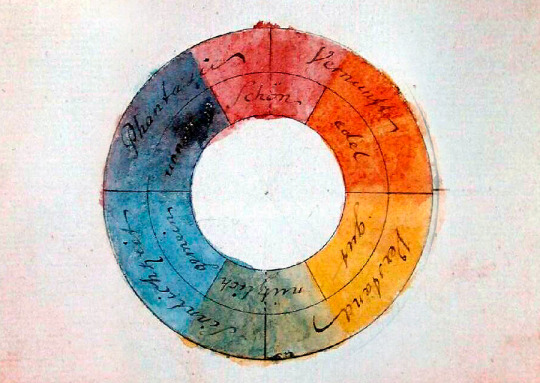
Goethe’s Colour and symbolic wheel (1809)
Part 1: A line in the sand
Goethe based his colour wheel and published writings on a yellow/blue polarity; that yellow and blue are the only pure colours; all other colours are degrees of these two.
Yellow is a light which has been dampened by darkness; blue is a darkness weakened by the light.
This yellow/blue polarity and its manifestation in shades, tones and hues of the natural and built environments, the garbs and settings of The Crypt of Tears, bring this duality into focus.
In Goethe’s colour wheel, yellow (good ’gut’) is the colour closest to light, and therefore both ‘pure and beautiful ... serene, gay, softly exciting’. But he acknowledges too the impact of combinations, of blending and shading, which he claims can produce ‘a very disagreeable effect’. The soft, stark and muted tones of desert towns, villages and landscapes represent, while not always disagreement, wariness and foreboding.
By a slight and scarcely perceptible change, the beautiful impression of fire and gold is transformed into one not undeserving the epithet, foul; and the colour of honour and joy reversed to that of ignominy and aversion.
Of blue (common ‘gemein’) he also suggests some caution:
As yellow is always accompanied with light, so it may be said that blue still brings a principle of darkness with it.
This colour has a peculiar and almost indescribable effect on the eye. As a hue it is powerful — but it is on the negative side, and in its highest purity is, as it were, a stimulating negation. Its appearance, then, is a kind of contradiction between excitement and repose.
The opening scenes of The Crypt provide an opportunity to consider the contrasting effects of the two pure colours. Jerusalem, in British-occupied and administered Palestine, is set in the yellow-browns of mudbrick and cobblestones, of ‘ignominy and aversion’, and this provides a backdrop to the complexity of the intrigue that is to follow.
Phryne erupts onto this scene in a tribute to blue’s ‘excitement’, robes whirling, glittering and billowing in her escape from the local administrative officers who are suspicious of her motives for being in Jerusalem. Her abaya and niqab with coin face veil contrast the muted, sandy tones of the squares, high walls and alleyways where the escapee jostles with crowds, donkey carts, baskets of commerce and motorbikes.
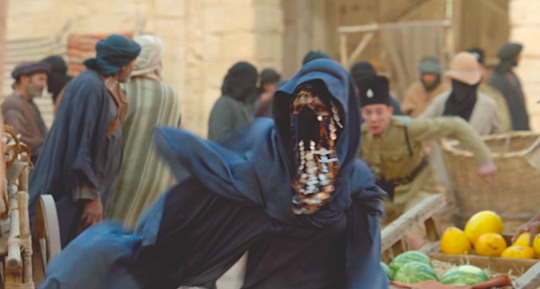
Her silhouette against a pure blue sky highlights the contrast.
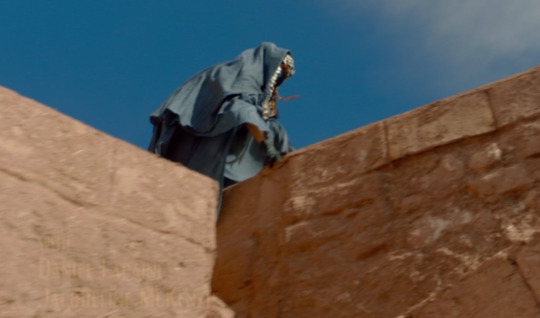
Indeed as if to reinforce Goethe’s yellow/blue polarity, Phryne abandons her blues for yellow’s purest form, 'the beautiful impression of fire and gold’ and the scene is set for the next escapade, to rescue the young dissident, Shirin, held in prison for her anti-colonial views. Fire and gold from pistol to toe.
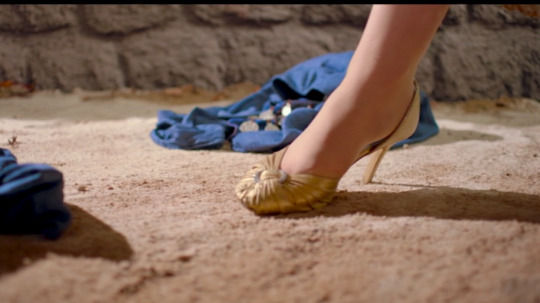
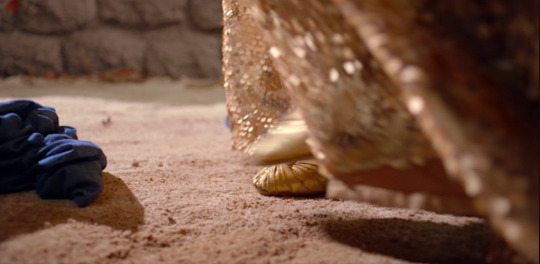
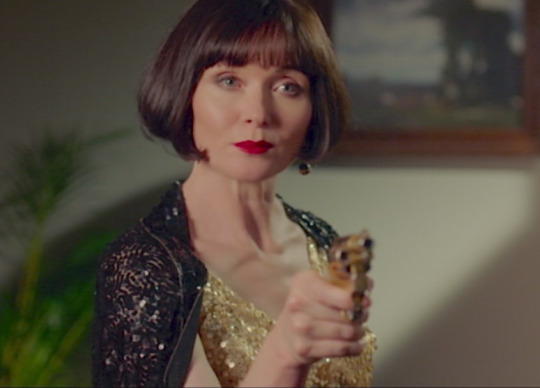
The yellow/blue contrast is reinforced in the scenes of Shirin’s imprisonment; the blue of her robes mirroring Phryne’s earlier dress, distinct from the dull yellow mudbrick prison, the walls and cobblestones of the square and the desert beyond.
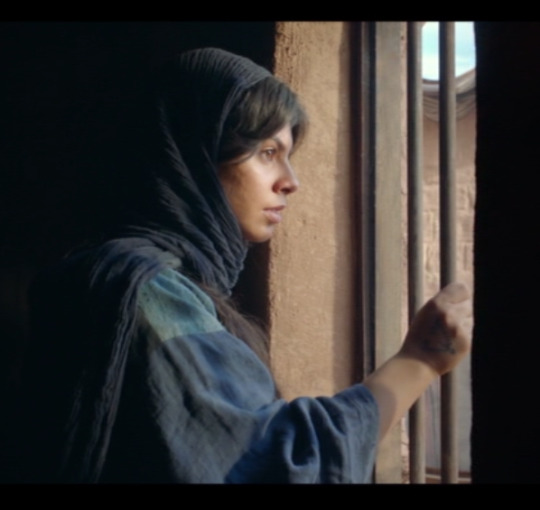
The blue of Shirin’s robes are a recurring motif, not limited to her incarceration but always reflecting its distinction from her surrounds. in her memories of earlier times, Goethe’s description of blue generating the ‘kind of contradiction between excitement and repose’ is brought into sharp relief. In each of the flashbacks of her childhood in a village in the Negev, blue dominates the sandy backdrop of social life and interactions.
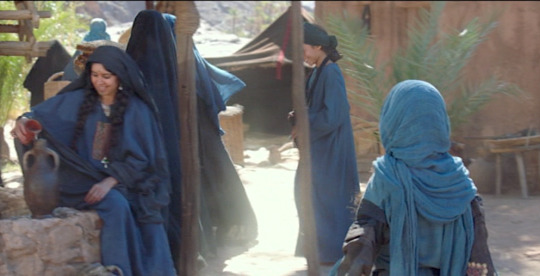
These early memories evince repose: the calm and order of village life and her relationship with her mother. They reveal love, warmth, closeness as well as indications of future agency.
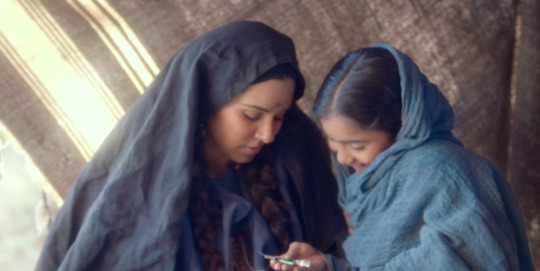
Shirin recalls a task assigned to her, that of collecting honey from the hives on the hills above the village. Although the purpose was unclear, she knew that one day the tradition would be revealed to her by her mother. The image of her journey on the fateful day of the attack foreshadows markers in a later scene.

Away collecting honey saved Shirin’s life just as its role was the preservation of another young woman. Her absence distanced her from the sudden and shocking assault which decimated her family and the entire village. In her recollections, the blue of sky and robes is set against the gold of honey pot and honey; the shattered ceramic and spilled contents parallel the death and destruction in the village below.
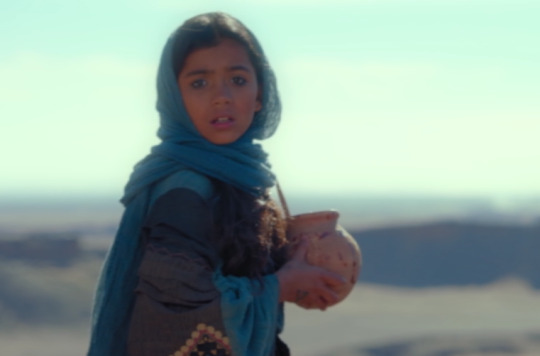
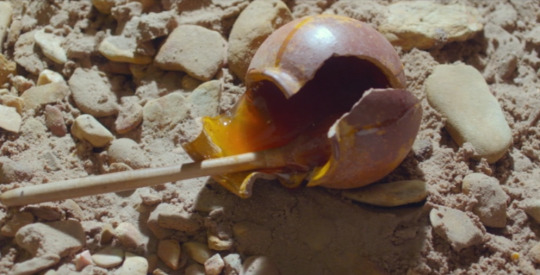
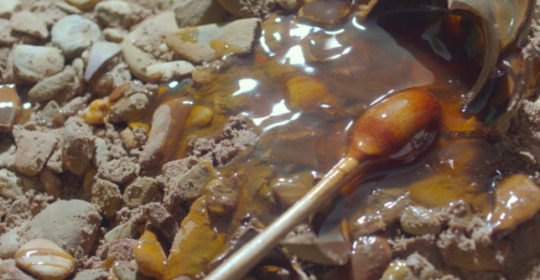
As the sandstorm engulfs the village and the curse is set in motion, Shirin’s only desire is to be enveloped within it, the blue to be absorbed into the raging ochre dust.
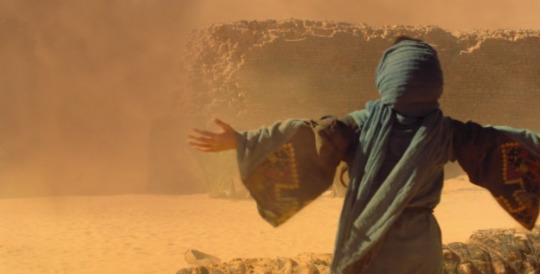
Part 2: Rapprochement
Maybe it’s too long a bow to draw to use a term usually associated with international relationships, but I’ll linger a little longer on the metaphor anyway. We need to consider the alliance between the central duo of the film, Phryne and Jack. An entente cordiale between them is necessary to reconnoitre with a stranger, explain a mystery, break a curse, unravel a crime and, ultimately, resolve a romance.
Phryne interrupts her own memorial service with a spectacular entrance in a yellow/blue dichotomy (aka biplane).
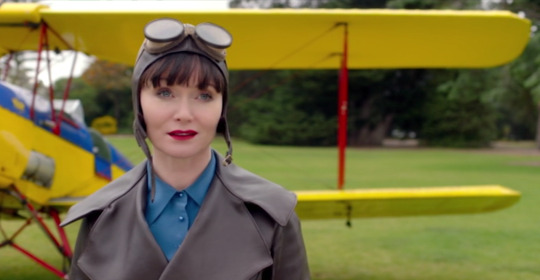
The rapprochement gets off to a rather shaky start: Jack is hurt, Phryne bemused.
J: Do you have any idea what it was like for me... reading that you'd died a horrible death in a foreign country?
P: Why are you so angry?
J: I wrote a eulogy for you.
P: My apologies for the wasted effort.
J: Oh, don't worry. It won't be wasted. I'll save it for the appropriate day.
It isn't long before circumstances see their reaching an agreement to prolong the colour scheme, brokered by a mysterious sealed missive, encounters in rain-drenched alleyways, and in a journey across the Negev to find the site of Shirin’s village and the key to an ancient curse.
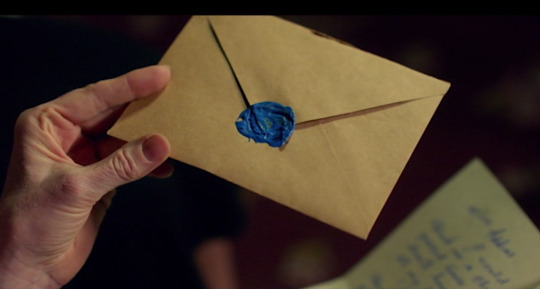
For Phryne and Jack this means some stunning silhouettes both in London and abroad. A precursor to purple rain perhaps:
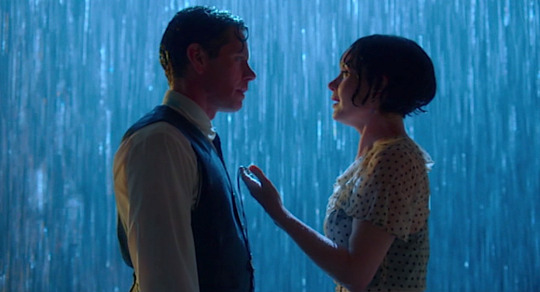
Any mutually-acceptable, bi-lateral agreement requires time, patience and some give and take in the negotiations.
The desert landscape, like those of Jerusalem and in the scenes of Shirin’s childhood village, constantly reinforce the complementarity of sky and sand. Goethe’s ignominy and aversion of muted yellow and stimulating negation and contradiction of blue accompany the journey.

There are traps for the unwary: a dishonest cameleer for example ...
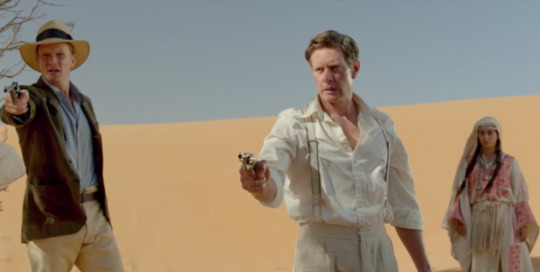
And in policy positions, stated and ceded:
P: Well, maybe I'll be absolutely fine without having to explain myself to you or any other man. And if I need your help, I'll ask for it.
J: I won't hold my breath.
P: Jack?
J: Don't worry about it.

P: I need your help! It's quicksand!
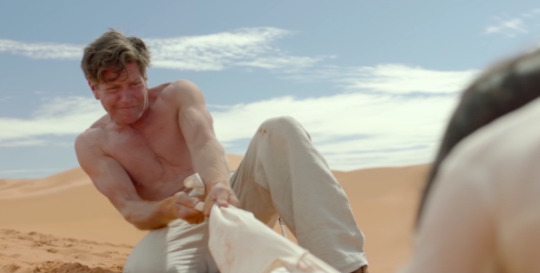
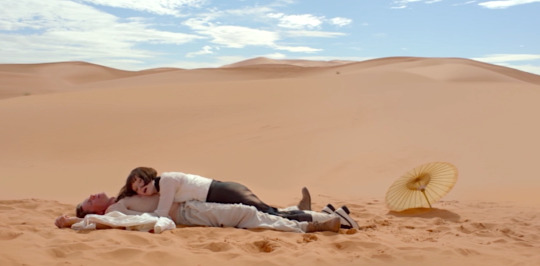
But the film isn't just about ignominy and aversion, negation and contradiction. Goethe’s colour wheel can provide the methodology for more insights - other symbols, senses and emotions circle around, wheeling about plot and character. What of red and green, purple and silver, ebony and ivory? Now there’s some food for thought.
To be continued...
#crypt of tears#MFMM#colour palette#yellow and blue#Goethe's theory of colour#parts 1 and 2#MFMM colur themes
56 notes
·
View notes
Note
In the books it's Mrs Coulter who decides she doesn't want anything to do with baby Lyra after the scandal, that's why she's given to Lord Asriel, not the other way around. The show changed this (and her character) completely. After the trial Lord Asriel is declared unfit for parenting and Lyra is given to a nunnery, but he decides to 'kidnap' her and brings her to Jordan College. And it's not like Lord Asriel is not left crawling as well, he used to be as rich as a king, after Lyra he had to swallow his pride and go beg colleges for funding (even 12 years later), whereas Mrs. Coulter (now a widow and free) is given funding by the Magisterium itself, so again, in the books she does achieve what she wants, in unconventional ways maybe, but she has her own research department and is never seen as subordinate to any man, until book 3 at least. And most importantly, in the books she subdues to no man, let alone Boreal. He's literally her puppet in the books 😔
I think you raise some good points here. But I want to say that my post about Marisa and the patriarchy was very much my own opinion and interpretation of both the books and the show from my own perspective as a woman having lived the experiences I have. That being said I do think I should go through your points and explain my own reasoning behind my interpretation.
1) Who got to take care of Lyra.
I never actually said that Asriel didn't want anything to do with Lyra. I do believe that both of them, in their own ways, do love and care about Lyra. They're just not very good at it.
But in terms of who took care of Lyra after she was born that responsibility immediately fell to Asriel. And there are probably lots of reasons for this. But, for me, I don't think that it was ever really a consideration or much of an option for Mrs Coulter to do so because of the environment of their world.
Marisa was married and had an affair that produced a child. In their world, women are second class citizens in comparison to men and as such any power or financial security that she may have would have been derived from her position as a wife. And a wife to a powerful man. To be able to keep a child requires resources that she would have only been able to get through her husband.
We know that Mrs Coulter kept her affair and also her child a secret because it would have ruined her. But also, I don't think we should forget, that she kept Lyra a secret from her husband to protect her too. As when Mr Coulter found out about the affair and Lyra he went to Asriel's house to kill them both, but Asriel got there first.
If you consider this, then Marisa wasn't really given much of a choice about what to do with Lyra. If she'd taken care of her herself then it's likely that her husband would have banished her from his home and therefore stopped her access to any resources, or he would have killed the child. Neither of those options look particularly good if you ask me.
Asriel's decision to "kidnap" Lyra and get her to Jordan is, to me, an act of desperation to protect his child in the same vein as Marisa's decision to not care for her herself.
Don't forget, by this point Marisa has been marked as an adulterer and a widow and is a pariah to most of society. She's also no longer under the protection of a man which is why the magisterium don't allow her to take Lyra back into her custody but instead give her to the nunnery.
Neither of Lyra's parents have many options when it comes to custody because of the patriarchal structure of their world. (although I highly doubt Marisa would have been let off as lightly as Asriel was in terms of breaking the rules about Lyra)
2) Asriel also had to crawl his way back.
Yes. You're right, Asriel did have to work his way back up to respected by society again. But as you yourself pointed out, his main obstacle was the loss of his money.
Asriel still retains his title. His academic standing is relatively untouched. He may have to beg to get funding but so does pretty much everyone trying to get funding tbh. The college's still listen to what he has to say. His name carries weight.
Let's compare this to what Marisa lost in the scandal. Yes, she didn't lose all of her finances like Asriel. But with the death of Mr Coulter she lost the male presence that in their society allowed her access to so many places. Without a husband she doesn't have the same security that she did before. She also lost her reputation, which for a woman (and not just in their world) is detrimental in how she is treated.
When I say that Marisa had to claw her way back into society I really do mean it. She wasn't just struggling to get finances like Asriel, she was struggling to be listened to, to be respected, to have any form of control over her life that having power gives you. Their world is deeply misogynistic so anything that Asriel struggled to gain, Marisa would have had to work against the same odds but also factor in her gender setting her back deeply.
3) freedom
Honestly I can't agree with your statement that Marisa is more free compared to Asriel.
Ok, so yes, Marisa gets funding from the Magisterium but that is explicitly because she is doing research that they want doing (experimenting with the concept of removing sin by cutting children) that they don't want to be seen doing because it's barbaric. Her research funding comes directly from the fact that as a woman, who's a pariah and not a member of the church authority, if what they were doing was made public she's easily expendable. Someone that they can deny ever colluding with. And Marisa knows this. She knows how vulnerable her position within the church really is. That the power the church gives her is an illusion.
So she creates her own power through using what condemned her in the eyes of the church against them. Her ability to seduce. They view her as a wanton adulterer so she uses that fear of her sexuality to arouse and then manipulate the men in power.
But this doesn't mean she not seen as a subordinate to a man. She 100% is. She has to answer to the male heads of the church. And is expected to bow down to their will when they change their minds. She doesn't have this freedom to do what she wants with her research that you say because she always has to justify her actions to a man.
4) Boreal
Boreal is not her puppet. Yes, he does do what she wants but that's because of his attraction to her. He doesn't submit to her desires because he respects her. He definitely doesn't do it because he sees her as an equal.
Boreal does what Marisa wants because he thinks that as a man he has more power over her. He submits to her whims because he think that if he plays along with her wishes and appeases her, gives her the illusion of having control over him, he'll be more attractive to her. All of Boreal's motivations come from wanting to sleep with her. And actually I'd argue that even more than that, Boreal is a collector (and this is something that the show drew on in the last episode) he wants to be able to say that he triumphed by being the first man to fully get Mrs Coulter to submit. He wants to own her.
And Marisa is fully aware of this. And yes, whilst being aware of how one is being manipulated does give you some power over the person doing the manipulating, it still doesn't negate the fact that the entitlement to her as a person that Boreal expresses comes directly from how their society views women.
Marisa's sexuality is both a weapon and also a cage. And I'm not going to go further into that here because tbh it's like a whole post on it's own and this is already way too long. (and also it makes me sad and stressed to think about).
I did just want to add on though to your comment about book three being the first time Marisa submits herself to a man. As you can probably guess I don't agree with that assessment, she is constantly having to submit herself to men and you can tell that it wears her down even if she pretends she's above it.
But even if you don't see all of her interactions as reflecting this then the scenes I think your referencing to in book three really do reinforce that submission is not a new act she's had to play. When Marisa is in Asriel's fortress and talks about playing the demure and naive woman with the generals, and even with Asriel (yes I know he's aware that she's manipulating him but I also think he's not aware of just how much), shows that it's not a new concept to her. It's definitely something she's had to do before. And honestly I think it's something she's had to do her whole life.
To summarise: yes Mrs Coulter is a figure of power in the books and is a master manipulator. But that doesn't mean she isn't constantly struggling against a world that condemns her as inferior because she's a woman. She's judged harsher because of her sex.
And you can't forget we only get her point of view in book three, but throughout the series you can see how her being a woman holds her back from everything that she wants to achieve and I still believe that going up against those struggles is a direct impact on her actions and who she is as a person.
She's spent her whole life fighting. And I think there's something really tragic about that.
#mrs coulter#marisa coulter#his dark materials#his dark materials meta#hdm series 2#hdm#lord asriel#long post#anon answered#sorry i have a lot of feelings about mrs coulter ok#hdm analysis
78 notes
·
View notes
Text
Watching spn for the 1st time in 2020 - Bisexual Dean
or,
How supernatural queerbaited itself into destroying the bi-erasure pit of darkness and i think it’s beautiful (in its own fucked-up way).
(apologies in advance for my crude language)
So I’m still in mid season 8 of spn and haven’t watch the rest but I had some thoughts about the clusterfuck that is Dean’s sexuality.
It seems like Dean was meant to be straight? I don’t think the creators/producers/writers, in the beginning, meant for Dean to be queer. To be honest I don’t even think they questioned it one second. If I’m wrong please correct me. Did the creator, Kripke, ever made a comment about Dean’s sexuality?
So the character is heavily presented as liking girls, wanting girls, banging chicks left and right (and all the girls he meets want to fuck him?? though i get it...). He wants to see female strippers, go to brothels, likes magazine porns, video porns, anime porns...
But at the same time Dean, actually, genuinely, regularly checks out guys ??
So we have : the guys he checks out, the doctor sexy thing, the fetish for male cowboy wear, the seducing of a guy with his words when the lesbian couldn’t do it ?? the siren who lures him by being a guy who’s into led zepplin and it works ????
So the creators didn’t meant for Dean to be queer and apparently the actor neither yet he is heavily queer coded ??
Apparently you can unintentionally be queercoding your own character ?!
Also, all of this is even without bringing up Castiel, so ...
And almost every time we have a brief apparition of queer Dean, you have in the next scene or so a big reinforcement of the “Dean wants to bang chicks” narrative.
And here’s my theory (as I said before, I haven’t seen the whole show yet so I may be wrong here, it’s just an outsider of the fandom pov but i’m open to corrections):
When realizing the potential of queerbaiting that they could do with the destiel situation, they reinforced the queercoding on Dean so the shipper audience could hope for a not totally straight Dean, while the general audience kept perceiving a totally, 100% straight Dean (queerbaiting at its finest, you’ve got to give it to them).
And it worked thanks to a marvelous little thing called bi-erasure. Almost every straight person do not understand that bisexuality is a real thing and not a stepping stone towards more gayer things. (Sadly enough, it’s also the case of a lot of gays and lesbians but that’s another conversation). So in their mind, (the general, straighter, public), as long as Dean was interested in girls, he couldn’t be possibly interested in guys. You could show him eye fucking Castiel all you want, if he reads an asian ladies porn magazine in the next scene, it means he’s straight (bi-erasure is a powerful thing I tell ya).
And if you think that’s not true, that people know about bisexuality and are able to put 2 and 2 together, well you would be wrong. The visibility of bisexuals really improved in the last 3/2 years but here I’m talking about 2013 and before (season 8 and before) and trust me, the kids were not that woke, I was one of those erased bisexual.
I even suspect the creators, writers, producers, not considering that bisexuality was a serious possible sexual orientation and therefore queercoding Dean “risk free” of being perceived too gay.
It probably sounds crazy for the gen-z (and thank god) but I swear that I lived my teenager years in a time were all bi guys were secretly gay and all bi girls just straight attention whores (you can notice how this joyful narrative comes from males being persuaded that everyone secretly want their dick...). Anyway, at the time, the general idea is that a guy who genuinely wants to bang chicks can not possibly want to bang dudes.
And that’s how they made the “totally straight eye fucking dudes Dean Winchester” work.
And here i’m extrapolating cause I haven’t seen the later seasons but my guess is that the years pass, the seasons keep being produced and they just kept the destiel queerbainting to cater to the hardcore fans (and the shippers, in every fandom, are always the hardcore fans, let’s not kid ourselves) without ever having the intention to make it canon.
But in the end, we come to a point where Dean has been queer coded for so many years, his relationship with Cas so emphasized, the general public made aware of the possibility of bi characters, that the only logical explanation is that Dean is genuinely in love with Castiel, and bi, and at this point, not making Destiel canon feels weird and homophobic.
Also, the idea of Dean being a kinda-repressed, semi-closeted, complete disaster bi makes SO much sense considering the character background, upbringing and current environment (like, seriously, the hunter community is not lgbt friendly...). Hell, I live in a big city in europe with liberals all over amongst family and friends and I’m not even fully out yet well in my twenties. You can’t expect childhood trauma, emotionally abused, ultra conservative and “manly” environnement Dean to get his shit together right away when he realizes he likes guys.
Anyway, all of that to say, that I don’t care if Dean is meant to be canonically bi or not, to me he is. Because I identify with the character heavily, and I love him and want to protect him and I don’t take arguments on that. I love the character that was created and evolved throughout the years, no matter if it is what he was meant to be or if it was unintentional (I did not expect to get emotionally involved in my “ironic” watch of spn in 2020 but fuck.)
As always, my sympathy to the spn fandom and my ever lasting admiration for the bullshit they endured through the years.
#spn spoilers#spn#supernatural#supernatural spoilers#destiel#deancas#castiel#dean winchester#bi dean#bisexuality#bisexual dean#dean is bi#supernaturale finale#spn finale#spn 15x20#supernatural 15x20#spn 15.20#supernatural 15.20#heller#1st spn watch
56 notes
·
View notes
Text
Day 5 - Daydream
Castiel sighed for what seemed to be the hundredth time since he got back from his break. Don’t get him wrong, he loved that part-time librarian job he got on the campus of his university. Mainly because it helped him earn a little extra money, but also because this work pushed him to meet a whole bunch of different people in an environment that he liked.
If one had to stick to the classical patterns of students, Castiel certainly belonged to the nerds club. He was rather reserved and always immersed in a book, in his revisions or, why not, absorbed by a game on his phone. Fortunately, Castiel did not wear glasses and did not know how to recite all the decimals of Pi to perfectly fit the cliché, otherwise, he was convinced that he would have far fewer friends than now. That was the sad reality around here…
However, he continued to be greedy for new encounters, convinced that each person possessed a unique beauty that he longed to discover. All this, however, contrasted with his unrecoverable shyness, prompting him to babble in situations where he was under social pressure. Thus, this work was perfect for him: he did not have to go to others, it was the whole university that came to him. Some came to renew their student cards, others came to borrow books or ask for advice on their homework and the rest just liked to go to the library to have a quiet place to indulge in their extracurricular activities.
To top it all off, his work did not require too much effort. Castiel was mainly in charge of restocking, setting up new books and welcoming students. As a result, he had enough free time to get bored and start imagining the life of every person passing the threshold of the library. Austin Southwest Institute of Technology was not particularly large, but it had enough students for Castiel to have not yet managed to learn all the faces yet.
There was one person, however, whom he found himself waiting for impatiently every day. It was obviously irrational, this boy did not pay him any particular attention, only making small talks a few minutes before leaving to sit in a corner of the library with a headset shouting classic rock in the ears for hours. But whatever the nature of their exchange, Castiel was dying to see even the hint of a smile addressed to him on the wonderful face of Dean Winchester.
Castiel sighed with spite. Damn it, he was ridiculous. He was no better than those starry-eyed girls drooling in front of the school jocks.
…Was Dean a sportsperson by the way? It was clear that he looked pretty muscular under his over-sized shirts. One day when it was particularly hot outside, Castiel even had the privilege of seeing him in a t-shirt, his muscular arms exposed to the sun filtering through the windows and… Okay, Dean was definitely athletic. In fact, Dean seemed perfect in every way, which was embarrassing because he knew very little about the dude…
The first time he had met him—if you could call it a meeting—was three months earlier, at the start of the school year, when Dean came to ask for his library card. That smile in his voice had been immediately communicative and Castiel had stuttered like an idiot after each of his jokes. He was still blushing when he thought about it…
Talking about a crush might not be too much in this case, but Castiel felt so helpless in the face of this situation. If he’d been a little braver, he’d have asked Dean on a date a long time ago. Instead, he spent his days hoping to see him at the corner of a shelf and daydreaming about a potential early relationship with him, even if it was a friendly one.
Still, Castiel was sure that being friends with Dean wasn’t complicated. He always seemed cheerful and friendly, never out of conversation and above all, very devoted to others. Sometimes he would lean on Castiel’s desk to talk for at least fifteen minutes, talking about everything really until another student complained that he was making too much noise. These were undoubtedly the days Castiel preferred. Although Dean was very inconspicuous and attracted a lot of glares when he laughed at Castiel’s jokes — although he did not see why his words were funny —, Castiel could not bring himself to gently call him to order. His laughter was too captivating for that.
"Cassie?" A voice suddenly echoed behind Castiel.
This one was taken away from his delusions and turned around. Balthazar, another two-year-older student also working at the library, appeared and saw the absent look on his colleague’s face.
"Okay…" Balthazar sighed. "I’m not going to ask you what you were thinking about because the conversation is going to revolve around that Winchester boy and annoy me again. So…” He turned around to point to a wagon, ignoring Castiel’s jaded pout. "We received this week’s order. It’s your turn to put them in the shelves.
"It’s always my turn to put them in the shelves." Castiel deplored, moving towards the wagon, while rolling his eyes.
"Yeah, yeah. Don’t forget those on the reserve either." Balthazar gave him a mocking smile before coming to take his place at the reception, taking out his phone without any more consideration.
Castiel shrugged and set to work. Among the shelves, it was more difficult to have a view of the entrance to the library and therefore of Dean’s arrival. But after a quick look at the clock, he realized it was already past 4:00 p.m. Castiel pinched his lips, unable not to feel this hint of disappointment at the idea that Dean would probably not come today. Suddenly, his already boring day was turning into a really bad day.
He was still dreaming of everything he could have talked about with Dean today when his foot tripped over a piece of warped linoleum and made him fall to the ground in a big crash. The books he carried in his arms were scattered on the ground while Castiel grumbled, attracting the curious glances of several students. Great… When was the day supposed to end already? Shameful, Castiel began to rise slowly, his eyes fixed on the ground, before hearing a slight embarrassed laugh.
However, he knew this sound far more than any other in this library. Biting his tongue of apprehension, Castiel raised his eyes to the source of laughter. Dean had just knelt beside him, his own affairs in his arms and looking at him with uncertainty.
"You’re okay?" He simply asked, and Castiel could not help shaking his head foolishly.
"Yes, no, it’s okay." He blushed slightly, growling inwardly. "I was distracted…"
Dean hummed softly and put down his notebooks before he began to help him pick up the books. Castiel remained stupidly motionless for a moment before imitating him, swallowing loudly. What could he have done to deserve such a humiliation today? However, Dean did not make any more fun of him and Castiel allowed himself to relax gently, glancing at Dean from time to time.
"I hate this alley too." Dean went on with a compassionate smile. "I must have stumbled at least a hundred times on the damn floor. It’s a shame, the books are rather interesting around here, but it’s at our peril." He let out a little amused sigh.
Castiel smiled back, grateful to the reassuring tone of the other student. However, he did not have time to reply that Dean resumed.
"Oh man!" He exclaimed, bringing a book to himself before smiling at the cover. "They seriously wrote a whole book about the Pi value? Damn it, my little brother taught me at least the first ten decimals of this thing."
Castiel suspended his movement before raising wide eyes to Dean.
"Really?" He asked, in disbelief, while tilting his head slightly.
This time, it was Dean’s turn to appear embarrassed and, if Castiel thought that his smile was the most beautiful expression of his face, it was only because he had never seen his cheeks turning red before. Dean raised his eyebrows toward him and scratched the back of his neck distractedly before resuming his task.
"Yeah, he loves math…" He mumbled, avoiding his gaze.
Castiel felt a laughter rising in his belly without ever passing the barrier of his lips. Dean Winchester knew Pi’s decimals. He could not prevent a dumbstruck smile to come up his face.
"I think it's... cool." Castiel said after a while.
These few words had the effect of relaxing Dean somewhat, who smiled back at him after a shy look.
"Me too." Dean admitted, nodding. "He’s four years younger than me, but he’s got the brains."
Castiel lapped up everything Dean said like a thirsty man. Every detail about Dean mattered to him, and just the proud tone he used in speaking of his younger brother was enough to reinforce the emerging affection Castiel had for him. With a light heart, he lowered his eyes again to pick up the last books when his attention was drawn to a piece of paper flying close to him. Frowning, he intercepted it and nearly lost his breath when he discovered what was on it.
Some would have lingered on the beauty of the drawings before their eyes, the confident features and the shades of gray reflecting volumes to perfection. Some were wonderfully detailed and others more quickly executed, giving them a certain charm. Honestly, Castiel would surely have looked into all this himself if he had not immediately recognized his face on each of these drafts. He remained frozen in front of these miniature representations, his eyes jumping from one drawing to another. He recognized himself on each illustration: him storing books on a particularly high shelf, him bored at the desk or helping Jack with his human sciences’ homework as every Tuesday. The majority of the drawings appeared to be made from the same angle, but each breathed a surprising delicacy.
"Whoops!" Dean suddenly exclaimed. "I think that’s mine."
When he tried to take the piece of paper back, Castiel withdrew out of reach and continued to examine the sketches. Dean blushed more and more, biting his lip with mortification. Finally, in the face of Castiel’s silence, he let out an embarrassed little laugh that could not hide his anguish.
"I… Yeah, uh… My brother is more of a scientist, but… I prefer to draw." He muttered before swallowing with difficulty." "But I can assure you that I am not freak with a weirdo obsession!" Dean added in haste. "It’s just that… the light is super good here and… Uh…"
Castiel nodded slowly before turning his gaze of admiration to Dean. This one swallowed again, playing nervously with the zipper of his leather jacket. Castiel felt exhilarated, the fragile hope at the bottom of his chest never ceasing to send bursts of happiness into the rest of his body. When he offered Dean a big, hesitant smile, he saw Dean’s shoulders relaxing slightly.
"I find it very successful. No one had ever drawn me before." Castiel confessed, sincere.
Dean let out a deep sigh that amused Castiel a bit more.
"Okay, great, because I thought my heart was going to jump out of my chest." Dean joked, not without a look still somewhat shameful, like a child caught in the act.
The two of them gathered the rest of the books and Castiel returned his drawings to Dean. At this precise moment, their looks crossed and none broke eye contact, their fingers brushing around the piece of paper. Finally, Castiel carefully followed the ridge of Dean’s nose until he reached his full lips soon joined by a piece of pink tongue that slowly moistened them. Castiel took a deep inspiration to try to stay composed, having the unpleasant impression that it did not work at all in front of these green and piercing eyes.
"Do you know which other place has great light?" Dean suddenly asked, Castiel’s attention jumping instantly from his lips to his eyes.
"Tell me?" He replied, bending his head to the side again.
"Bobby’s café three blocks from here, on the main avenue." Dean smiled with a pout that twisted Castiel’s stomach in all the right ways. "Tomorrow, 5:00 p.m.? I think I really need to practice my shadows…"
And although Castiel wanted to contradict him on the quality of his drawings, he felt his throat tightening to Dean’s words. Was it a date? Because it sounded dangerously as such and Castiel could not wrap his mind around it right now. He was probably in the middle of another one of his daydreams, wasn’t he?
"Of course, if I can help…" The words left his throat by themselves and Castiel was almost sure to gain a few more colors.
"Great!" Dean exclaimed, his lips stretching out in another dazzling smile. "Wait, take this in case you can’t find the address."
Immediately, Dean took a pen out of his bag to come and scribble on the paper with his drawings. When he handed it to Castiel, he noticed a telephone number with Dean’s first name beside it accompanied by a smiling smiley face. Castiel remained foolishly in front of the paper, his body having apparently stopped consulting his brain to make him ridiculous.
"T-Thank-"
"Gee, I have to go!" Dean cut him off, checking his cell phone. He put a warm hand on Castiel’s shoulder before he started to walk away. "I’ll pick you up tomorrow after work, okay? We’ll walk together to the café. See you later!"
And just like that, he was gone. Castiel was still trying to figure out what had happened. Dean asked him out on a date, handing him his telephone number to give him the address before telling him that he would pick him up directly from the library. Dean who secretly drew him from God knows how long or even used a nickname at the end of their conversation. Oh and, also: Dean Winchester asked him out on a freaking date.
When the reason of his daydreams was definitely out of sight, Castiel looked again at the piece of paper before feeling a broad smile covering his face. He sighed before folding the paper and slipping it into his pocket. It was good to have dreams.
* * * @winchester-reload Some more tooth-rotting Destiel fluff for you, hope you enjoyed it!
You can find the whole series on Ao3
Tag list /!\ PLEASE TELL ME IF YOU WANT TO BE ADD TO (or removed from) THE TAG LIST so you won’t miss any updates.
@misha-moose-dean-burger-lover @styggtroll @thanks-tacos @petrichoravellichor @iamcharliebradburylevelperfect @ladywaywarddsc @hellfire37 @destiel-221b-sabriel @aloha-cowgirl @destielhoneybee @dysfunctional-destiel @ozonecologne @doofcas @castielrisingabove @zoerayne2426 @tibbinswrites @vicmc624 @thegirlofstarlight @berrieseveryday @staycejo1 @certaindeanwinchesterforcastiel @bab-spnfamily @lo-mindpalace
#suptober20#day 5#Destiel#suptober2020#suptober#inktober2020#inktober#supernatural#supernatural fanfiction#supernatural fanfic#alternate universe#college au#university au#Destiel fanfic#destiel fanfiction#dean x castiel#CasDean#deancas#librarian castiel#student castiel#student dean#Castiel has a crush on Dean Winchester#Dean knows how to draw#dorks in love#fluff#shy castiel
45 notes
·
View notes
Text
Cole Sprouse earlier this year:
“To love one’s self while being in love,” he captioned the photo. “To seek a validation of your spirit in another, while honoring a confidence of self. To be true to one’s self in the sacrifice of compromise. A little Tuesday give and take.”
This is probably the closest we’ll come, at least in immediate future, into Cole’s insight of what issues they were having. I can’t claim to know either of them really beyond what they choose to let people see or hear. I may have some suppositions but nothing confirmed. It doesn’t ever really matter because I have no right to know but in regards to this never ending drama from one parties part I’ll relate a few thoughts.
I have no means of verifying who broke up with whom, or if it was actually a “mutual” decision or one someone wanted more than the other did. I can just say if I were an outsider, which I am, and now knowing per Cole the final break came at some point in March (we don’t know when during that month) that based on Lili’s actions he likely took the lead on it. Based on inferences her mother made in DM’s/Lili’s own words I think it’s reasonable to assume there was the “feeling” that Cole “betrayed” her in some way.
Given Cole’s brief released statement, and he is a smart man, he made a deliberate attempt to delineate when they were in a relationship and when they were not. He’s also made it clear he is not a cheater. My supposition? Cole knew of the rumors/allegations made via social grapevine. I don’t know if he has had any one night stands during the separation or since the final breakup but my guess is Lili at some point thought he did at very least hence her temperamental behavior.
Now everyone has different feelings on sex. Some see it as physical release, some as an emotional bond, some as spiritual bonding, some as about procreation etc....I’m not here to get into what your views, theirs or mine are on it. It’s really no one’s business. I’d personally advise given the disparate views on the matter if you hold out any hope/wish of reuniting with someone that it may not be in your best interest to pursue that physical relationship with anyone until you fully resolve your intentions with someone else to avoid any messiness but it doesn’t make someone a cheat if they don’t.
At any point I think he released that information to 1) reinforce he was free to be with anyone (be it as a friend or something more) as not together and therefore no one had the right to judge or question that and 2) make it clear it was no one’s business/leave the people he spends time with alone.
Now what does this have to do with anything? I think Lili maybe held out hope of reconciliation and Cole’s appearance of moving on, whether did in any fashion or not, triggered her. I think in some ways they have very different views on these matters so the feeling of “betrayal”, the enhancement of bitter feelings, the need to put on a show that she is just fine without him that lasted a few weeks. The typical things women tend to do in breakups like leaning on her affection for her dog, spending more time in her personal gym in an effort to feel better about herself, self help books. Common things women do post break. I even think she may have cycled back briefly to thinking maybe they could still worked things out given shown may have misjudged earlier impressions hence reaching out to his friends/family more and other weird things that didn’t and still don’t make sense. Also think he firmly put that idea to bed with his statement and so we again get the spiraling in the recent interviews, recent attempts to find herself in spiritual fads and renewed bitterness.
And you know...most of this is fine by me if true. Except the interaction with the fans and the whole doxxing of Cole’s location TWICE, ....and the trying to hook young fans into getting scammed with this reiku business, She’s allowed to feel however she wants about a breakup especially if she didn’t initiate it. It usually stands to reason a person who initiates, while still may be mess themselves, may be further along in the acceptance of its end. I can even on some level understand it’s easier said than done to be a professional and get over having to portray a loving couple with your immediate ex. As upset as I am with her more so over this Barchie stance than anything with Cole (minus the doxxing), I get it. Kissing a guy for work you were intimate with who probably initiated the breakup, one you may not be over, it would be tough. I actually get it.
I don’t think they have to be best friends or she has to be fine with it. What I can’t get over is why it had to be public. Why the fans had to be dragged into this for 6 months. None of this public messiness ever had to occur. It could have been contained to just family, friends and co-workers. Even the social entertainment world has been largely muzzled on digging further. The only reason we have any insight to any of this is because she and her mother couldn’t keep their mouth shut. And in the end this is what *I* am bitter and disappointed in because foolish me I thought she was better than this.
As for Cole? If we ever do get further insight than that quote it’ll likely be when removed from his current environment and doubt will be a full fledged tell all. And I don’t by any means think he is perfect and issues were all owned by Lili. But that quote does suggest despite whatever self doubts she may have about herself it had nothing to do with how she looked or wanting someone else as some of her fans accused him of. Seems the issue from his perspective in at least some fashion had to with feeling he was compromising himself/his desires to make someone else happy and maybe in end not too happy himself. But, this is all, as always, no more and no less...my supposition and could be entirely wrong or partially (probably am) wrong.
42 notes
·
View notes
Text
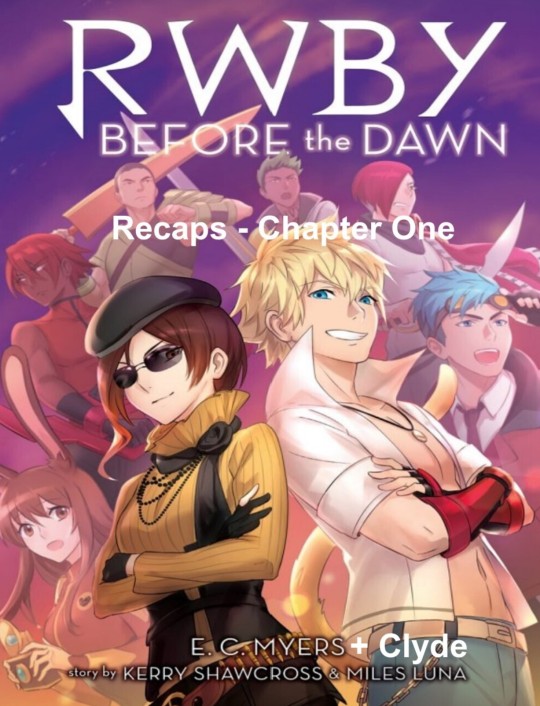
Welcome back, everyone! Today’s recap is surprisingly positive. I liked a lot of what we got in Chapter One, with the biggest complaint being the sheer amount of Sun-bashing throughout. On the one hand it does decent things for Coco’s characterization, on the other hand… we’ve really got to rake one character across the coals in order to forward another? It’s a mixed bag, but we’ll get to all that.
Initially we open on SSSN and CFVY having breakfast together. Which Coco is surprised to find herself enjoying. In fact, she’s enjoying it so much that she’s called out for laughing/smiling too much.
“I thought you boys liked it when girls smiled,” she said.
Honestly? I’m here for the lesbian weaponizing that against a bunch of guys. I’ve been told to smile so much in my life that I too would get snarky if I was then told to stop. I can be petty that way.
Of course, Coco isn’t really the victim here. She’s specifically laughing at the fact that her team needed to help Sun out last night, which is not only mean (I do support the boys telling her to knock it off even while I support snarky quips about smiling) but also flies in the face of everything huntsmen are supposed to represent. I’m honestly surprised by the amount of disdain for teamwork throughout both the web-series and this book so far. It’s like Ozpin tried to teach his students – and the audience – that teamwork is a necessary skill by creating literal teams… but instead of learning that every huntsmen in training went, “Great! Now that we have these teams we’ll never need to work with anyone else ever.” There’s obviously some leeway here in regards to how Team RWBY became Team RNJR and then Team RWBYJNR(+O), but their mega team has the same ‘us vs. the world’ attitude that Coco displays here. Factor in the team partners and it feels like everyone missed the memo about working with others being a good thing.
We’ll see this again just a little farther along, when Coco mentally complains about how SSSN only “assisted” them previously, not “rescued.” It’s the same distinction Sun made in the prologue: You didn’t save me. Even though they did. Coco is more concerned with how SSSN is tarnishing the “shine” of their reputation, rather than how they helped her or how she, in turn, could help them. Whenever the main story insists that the antagonist of the week is dividing the world for Salem, I want to point very emphatically to the heroes who are supposed to be enacting that unification... but aren’t. If they can’t even admit that a peer helped them without scrambling to assuage that supposed blow to their pride, how are they ever going to deal with the actual, weighty ethics of these problems? The ‘my way or the highway’ attitude we’ve seen Ruby display starts here. Everything is black and white. It’s simply not possible for them to be impressive, capable fighters and in need of rescue now and again. Therefore no rescue took place and peers – however subtly – are viewed as competition at best, potential enemies at worst. When you take these teens out of school and put them in, say, a military environment where your peers have incredibly difficult decisions to make… that’s where problems crop up.
I also think it’s worth acknowledging that Sun was in legitimate danger last night. Unknown adversaries + an inability to combat them = potential death. Sun even comments in the prologue that he has to keep a close eye on his aura because otherwise he might come out of this encounter seriously injured. It reads as continually strange to me that characters who just lived through a major battle still have the confidence and naivete needed to view Sun’s encounter as a hilarious one-upmanship. ‘Ha! My team had to save you~’ should not be the reaction of kids who now fully understand the ‘save you’ part. The world is dangerous and unpredictable. People have died. Sun himself could have died or just (“just”) been hurt. What’s funny about that?
Meanwhile, the rest of SSSN is pretty pissed. Neptune likewise thinks Sun getting beat up “on your own turf” is funny, but Coco notices his angry tone. She wonders “if he meant he wished he’d been there to watch more than help.” So yeah, really pissed. What stands out to me though is that these are just feelings. The act of thinking and saying horrible things – “If you were one of my men I’d have you shot” – is not the same thing as actually acting them out, or allowing them to happen. I have no doubt that if Sun were in trouble Neptune would do everything he could to help him. The SSSN group would not literally stand by and watch a teammate get beat up… which just re-emphasizes for me how horrible Team RWBY’s actions were in Volume 6, watching indifferently as Ozpin begged, cried, and was attacked. For all this book’s problems, there’s a lot in this chapter that I wish we’d seen with Team RWBY. A moment where the group implied they were angry enough to abandon Ozpin but not actually doing that would have made a massive difference.
Coco notices Neptune’s meaning, but “she doubted Sun had the awareness to see that.” From here on out the Sun-bashing picks up and it’s… a lot. Far too much in my opinion. She mentally claims that Sun attaches himself to better teams to “make up for the fact that he and his own team were mediocre at best” even though, to my recollection, we haven’t seen any evidence of this. SSSN has potential, but only if they get a strong leader. Meaning, in her opinion, not Sun. He’s “too unstable, too unreliable” and Coco doesn’t even like eating with him most days, especially since she blames him for messing with her team’s morale. There’s exactly one moment where she agrees with him… and feels the need to remind herself (the reader) that it’s just this once. She also has little qualms about saying at least some of this to his face.
“But it is our business,” Coco added. “We don’t need you. No offense.”
Scarlet stood. “Why would I take offense?” he asked. “Just because you think you’re too good for us.”
Me experiencing the second-hand discomfort:
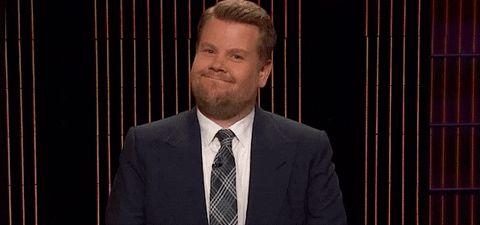
WOW that’s a lot of anti-Sun sentiment. As mentioned at the start, I do think this work brings some value to the story. Meaning, characters are allowed to dislike other characters and it helps make Coco a well-rounded person to show that she has this flaw of being judgmental and overly critical. We know it’s a flaw because of how her team reacts to her comment:
Coco glanced at her team. Velvet avoided looking at her, which meant she wasn’t on the same page this time. Yatsuhashi looked uncomfortable, but he kind of always did during personal conflicts. And Fox—
“It wouldn’t hurt to have some reinforcements,” Fox sent, using his telepathic Semblance, presumably just to her.
“I don’t disagree,” Coco sent back. “If it was the right team.”
This is good! Velvet and Yatsuhashi’s body language tells us they don’t fully agree with Coco, if at all. Fox is comfortable enough to push back some and suggest that they could use the support. Coco, in turn, doesn’t brush him off. She still holds the opinion that Sun and his team aren’t the “right” kind of support, but she’s not rigid in her stance. She values her team’s opinions and is flexible enough to start accommodating them, even when they bump up against such an intense bias. Later in the conversation, Coco will outright ask for Velvet’s opinion and, based on that, changes her decision:
“What do you think, Velvet?” Coco sent.
Velvet was quiet for a while before she lifted her eyes and looked directly at Coco. She smiled. “I like proving people wrong.”
This is the sort of work I wish we were getting with Team RWBY. Behold! The leader can be wrong! Her team doesn’t always agree with her! They tell her as much and she takes those complaints seriously, resulting in a change! It’s such a sharp contrast to Blake’s elevator promise, the group keeping dead quiet as Ruby lied, everyone just shrugging off their supposed discomfort with that, Blake and Yang spilling secrets to Robyn and the team apparently doesn’t care… The writing could take some tips from this scene here.
However, all of this only comes about through that intense Sun-bashing. Which, coupled with the opening that was hyper-focused on showing how inept he supposedly is, is A Lot. It’s great to round-out Coco like this, it’s just too bad it came at Sun’s expense. Anyone who is a fan of his isn’t going to enjoy another character given so much space to criticize him with comparatively little disagreement, given that Sun’s team is also mad at him right now. He has no support here, to the point where any defense is given the ‘but you’re not totally wrong’ caveat.
“And you’re not exactly the best and brightest student at Shade,” she added silently.
“Harsh,” Fox sent.
Okay, so she hadn’t thought it silently enough.
“But fair,” Fox added.
I know I wouldn’t enjoy reading that about one of my faves. Indeed, I’ve already sat through it. It’s not enjoyable.
(Aside #1: I want more info about how Fox’s semblance works. Specifically, I want to know how others send him a message. It’s clear here that Coco didn’t mean for him to hear that thought, so did she accidentally do something to send it to him? What does it mean to think it “silently enough” that Fox won’t pick up on it? Is it a matter of “speaking” deliberately inside your head? Or does he have the potential to hear any thought passing by? Which would be one hell of a privacy issue…)
Not much happens plot-wise during all this. It’s mostly Coco’s thoughts with that dash of disagreement regarding whether SSSN should help out. We do learn, however, that “the native Vacuans called them weak for abandoning Beacon Academy” and uh…
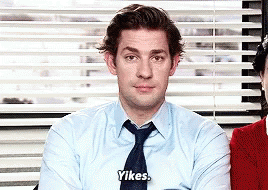
I hope I don’t need to explain how getting overrun isn’t the same thing as “abandoning” their school. However, this does cast the prologue in a new light. If Vacuo is THAT obsessed with standing your ground, was Sun’s clan just outliers for deciding to move? Obviously you can’t paint a whole kingdom with one brush, but it feels weird to get wise ‘Some battles you can’t win’ advice in one chapter and then in the next learn that (apparently) most Vacuans are so stubborn they view a tragic defeat as abandonment.
The conversation segues into how Headmaster Theodore hasn’t done anything about the Crown yet, but Coco is more shocked that Sun refers to him as “Theo.” As someone who grew up calling teachers – including principals – by their first name, this made me laugh.
That aside, Sun clearly has some connection to the headmaster. Something from the first book I missed? Entirely possible. I’m figuring this out as I go. The important bit is how the conversation actually tackles student agency vs. responsibility. Or, whether a bunch of unlicensed teens should be getting involved in a dangerous mission they already handed off to the professionals:
“Keeping us in the dark isn’t going to help anyone,” Coco said.
“You keep forgetting,” Scarlet scoffed. “We’re just students.”
“We’re already better than a lot of trained Huntsmen,” Coco said.
“But we still have a lot to learn. And we’ve already failed to defend one school.”
Coco corrected him. “We were all taken by surprise. Haven fared better.”
“Most of us weren’t even there, and I still wouldn’t call that a win,” Scarlet replied.
I appreciate that both sides are given weight here. Scarlet and Coco are allowed to make points as equals. Obviously given that this is a fighting story with students as protagonists, the plot is going to find ways for them to get involved. I’m not at all surprised that, by the end of the chapter, they’ve re-established the “need” to investigate despite being told that at least one fully-trained huntsmen was already handling it. We have to have a story. However, we can’t ignore the in-world fact that yes, they are just students. No, they’re not better than a lot of trained huntsmen (some, sure, but Qrow could kick their ass). They did get in over their heads. And “we were taken by surprise” isn’t the defense Coco seems to think it is. If you can’t handle a surprise attack... you’re not ready. To ignore all this is to write characters who come across as arrogant to the point of delusion. By having at least one person point out the flaws in this thinking, they read much more like young people trying to make a difference and letting that drive/impulsivity carry them a bit too far. That’s relatable – and engaging. This is more work I’d like to see with Team RWBY. Less, “That was before you trained us” and more “You keep forgetting, we’re just students.” It’s the heroes who are perceived as “just” something and manage to save the day anyway that’s exciting. Not the heroes who come sauntering in proclaiming that they’re the best ever and then manage to scrape by because the plot ensured they would. Or again, make one or two characters like that. Not an entire team.
(Aside #2: Sometime during all this Fox is referred to as “Fox Alistair.” Why the last name in the middle of a scene??)
So the whole group is upset that the headmaster doesn’t appear to be doing anything. Sun wants to help and feels strongly that they need it. Coco is adamant that they may need help, but not from him. During the course of this the Great War is brought up and the long-standing bias it has produced:
“The Great War again.” Coco shook her head. “Ancient history. Let it go.”
“Easy for you to say,” Sun said. “But have you let go of what happened to Beacon?” He sat down and put his hands together. “You. Need. Us.”
I get the point that Sun is making but uh… those aren’t the same thing. As Professor Rumpole will acknowledge in just a bit, even something from fifty years ago can feel like “ancient history” to someone who didn’t live through it. A war that ended eighty years ago – and began a decade before that – simply isn’t going to resonate emotionally with the new generation. They’ll feel the impact of it, but it’s still different. Trying to compare a kingdom’s attachment to something that happened a literal lifetime ago to the tragedy that they all personally experienced a year ago is unfair. It’s like if someone rightfully pointed out, “Hey, I want to acknowledge that the people down the street shouldn’t automatically hate me for something my grandfather did to their grandfather” and the response to that was, “Yeah but last year someone did something horrible to you and you haven’t let that go, so…” You’re talking about two very different situations, not to mention trying to use that trauma as leverage. Coco gets mad at Rumpole for doing the same thing in class: don’t use the fall of our school as a point for your argument.
This whole chapter has a running theme of history and its impact, including a dual joke from Fox about “those who miss history are doomed to repeat it” (that is: the old adage of learning from past mistakes as well at the fact that if they miss their literal history class they’ll need to repeat the course). Which, taking the novel as a whole, is presumably reflective of these two teams. I may take issue with the pervasive perspective that huntsmen can get by on their own, but the fact is that Sun and Coco do work together, despite the complaints. It’s right there on the cover. So we have this larger setup of kingdoms fighting and the ways that this is still negatively impacting the next generation. Now here that generation comes along, struggling with but ultimately overcoming that hurdle. We will work together. We will choose to trust one another, hard as that is. It’s – again – a better example of the younger generation surpassing their elders than what the web-series has managed to give us lately.
Right now, Coco is only agreeing to work with SSSN because she intends to avoid problems, not because she thinks they’ll be a benefit to her: “It made sense to combine their efforts—if only to make sure Sun didn’t get in their way, or to make sure Scarlet didn’t rat them out to Rumpole.” It’s a horrible thing to think about someone, let alone a someone who is meant to be a friend. However, the hope is that Coco grows over the course of the novel. I certainly hope poor Sun doesn’t spend 200+ pages helping her only for Coco to come out the other side still holding such a low opinion of him…
So we get a bit more about how scary Coco can come across as, how much she enjoys that, and how “This whole ‘accepting help’ thing wasn’t exactly her style.” We get it. The powerful huntsmen never need help, etc. etc. Maybe I’m just a community-driven gremlin but I find this concept of extreme individuality to be terrifying. Accepting help is absolutely my style. Please help me. For the love of God, if anyone can make this world a little more manageable I will take it.
I’m not a cool girl like Coco though. Maybe that’s the difference.
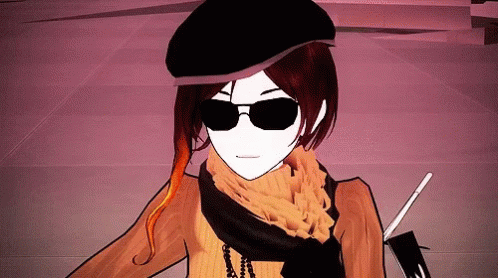
The group finally goes to history class where they hold their heads high despite coming in late. No, no, no. No feeling pride over disrespect. Rumpole has every right to be shaking her head at them. You’re late because something came up, you accidentally slept in, etc.? That’s life. You’re late because you couldn’t be bothered to arrive on time and think you shouldn’t feel any guilt over that? C’mon.
All of which segues into how Coco was in “her share of disciplinary meetings” back at Beacon. In contrast to the head-held-high attitude though, Coco admits to herself that she found the feedback valuable. As she moves through thoughts about how she totally doesn’t need praise, Fox corrects her:
“I don’t need eyesight to know you’re great, Coco. But maybe those shades of yours have been distorting how you see things. Try taking them off once in a while. You’d be surprised to learn there are lots of people outside of our team worthy of praise.”
I am legitimately enjoying a main character – a leader no less – getting kindly called out for their inaccurate perspective. That’s what we want!! Growth!!! Especially since Fox neatly ties this back to the real conflict at hand: “You’d be surprised to learn there are lots of people outside our team worthy of praise.” Indeed, Coco does try taking off her glasses (horrible as that metaphor is. Like... it’s really awkward) and is then able to articulate just how much she appreciates Rumpole. I’m not going to lie, reading a scene where someone over 30 is praised and respected did my heart some good.
(Aside #3: I’m having trouble reconciling this Fox with the one I know is going to appear later with Neptune. It’s quite a leap to go from wise ‘Other people are worthy of praise’ to being so uncaring you’ll advocate for the continued torture of a peer...)
We move through Coco’s admiration for Rumpole’s fashion and how that reflects her personality: stylish but, at the end of the day, practical. We get some nice details about Fox keeping the team awake and giving them answers with his semblance, which is exactly the way I would expect students to use telepathy in class (alongside singing annoying songs to piss each other off, reading aloud memes they’re looking up on their phones, desperately asking what the hell the teacher just said because oh god it’s going to be on the exam isn’t it?) Eventually all this leads to Coco subtly calling out Rumpole for – supposedly – not investigating the Crown. Hey, teach. Why are we learning about this time period now? Don’t you want to talk about when the crown was the center of authority around here?
It's subtle… ish.

Message received, Rumpole speaks with them after class to explain that she hasn’t brought this to the headmaster yet because he’s got too much on his plate. Instead she’s investigating it personally and will fill Theodore in when she has something substantial. Coco, while pleased that Rumpole hasn’t completely blown them off, is insistent that dealing with today’s problems is all that matters. Who cares about tomorrow?
“That’s a luxury you have as a Huntress in training. Theodore has to be concerned with both today and tomorrow.”
Ding ding ding! This is Team RWBY’s problem too. What do you mean we can’t just solve this problem here and now? I want to fight today, no matter what that might do to tomorrow. Meanwhile, Ozpin isn’t just thinking about tomorrow, but generations of tomorrows. This is a luxury that only the very young and the ones without responsibility can have. Make them fight for a thousand years and they’ll start caring about what the next thousand will look like. Give them the weight of a kingdom and watch them weigh decisions when, suddenly, it’s no longer just their own lives they’re risking. God I hope Team RWBY starts realizing this in Volume 8…
The only downside is that Rumpole provides all this via more shade thrown (partly) at Ozpin: “The headmasters of the other schools have been reckless, negligent, or overprotective.” Thus far, the people of Vacuo seem quite happy to assume they would have done better in Beacon’s place. Well, if I were at Beacon I simply wouldn’t have abandoned it. If Theodore was headmaster there it simply wouldn’t have fallen. That’s a luxury of Rumpole’s own: the ability to stand safe in a currently untouched kingdom and assume that, if put in the same position, she and her people would have come out for the better.
She continues with,
“Theo’s first priority will always be helping you reach your full potential, making you strong enough to survive anything that comes your way. He has your best interest in mind, no matter where you come from or where you started your training. Who else can say that?”
Uh… Ozpin?
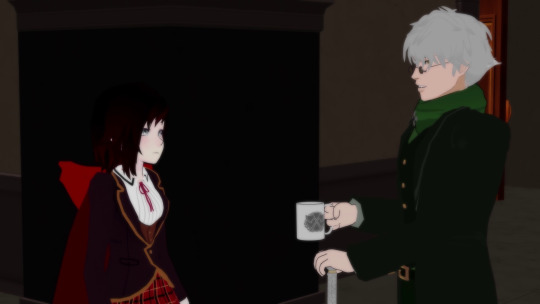


Absolutely Ozpin.
However, Rumpole does provide good reasons for why the group should hang back. Not just the “You’re students” argument but also an acknowledgement that she has very sensitive leads going. Getting others involved might jeopardize that. Of course, they interpret all this as Rumpole just telling them to be cautious. Get involved, just don’t get caught. As mentioned above, this was inevitable. There’s no story without the group’s involvement and coming up with ways that they oh so unexpectedly (conveniently) end up involved without intending to be can get very old, very fast. So I get it. Let’s just hope that they go about this in a way that doesn’t make them seem like completely over-confident fools.
So all in all not a bad chapter. At least comparatively. If you’re able to overlook the Sun-bashing and the execution of some ideas (the prose is still incredibly messy in places) there’s actually a lot of work here that I appreciate. Work I’d really love to see implemented into the web-series. To be frank, it’s not that I think this is all particularly good… just not particularly bad either. Good for RWBY, shall we say. In another franchise I’d be heavily disappointed in this, but for a series with so many other flaws lately? Seeing just an inkling of this complexity is a relief. Even if the details grate.
Only question is, can the novel maintain this low-bar standard all the way through? Based on public reaction I’m gonna guess no…
But we shall see! 💜
40 notes
·
View notes